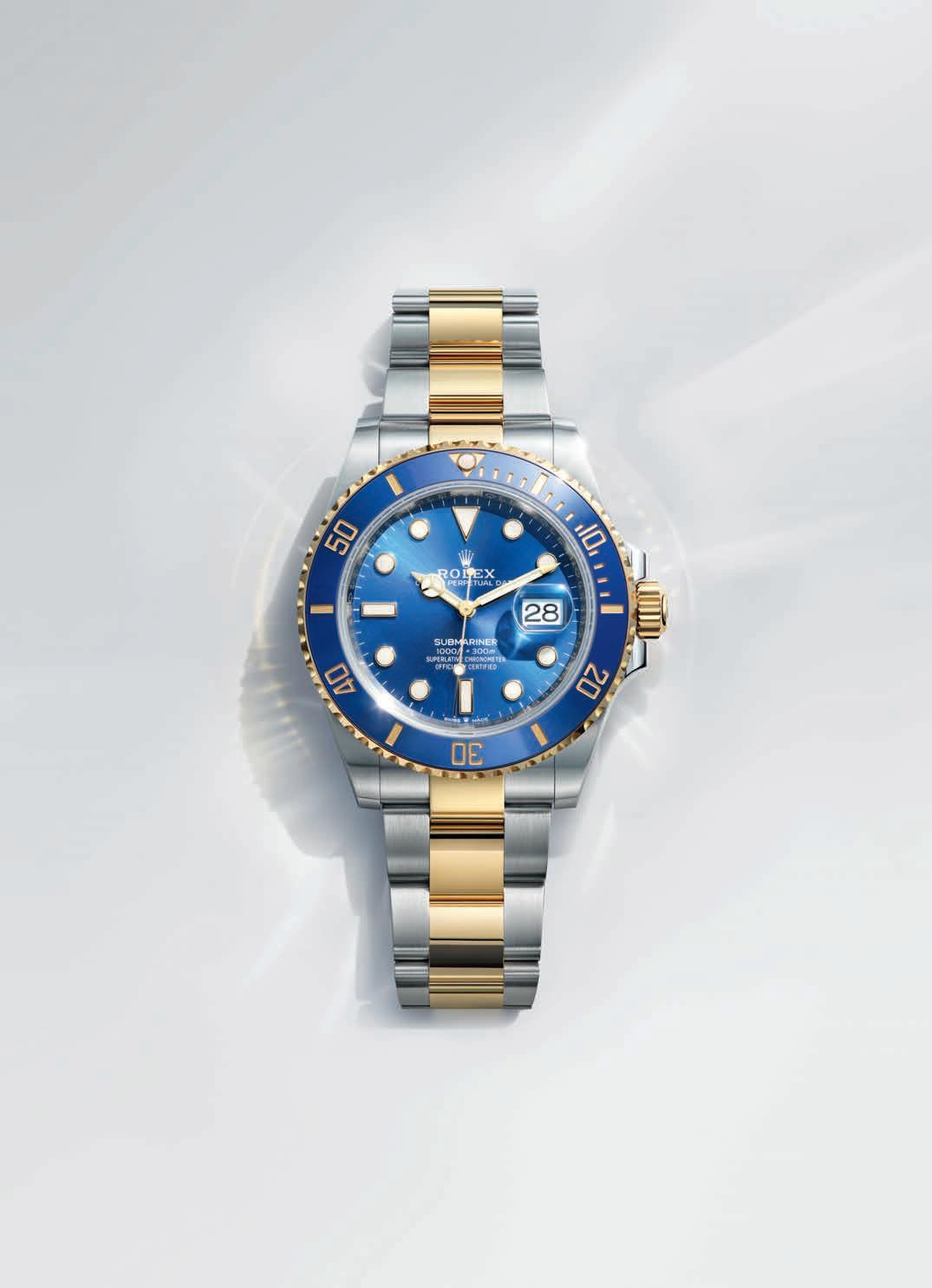














































Creating culinary theatre from the bounty of land and sea





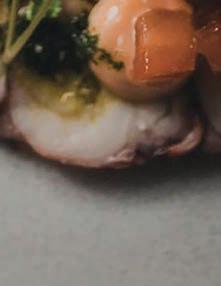


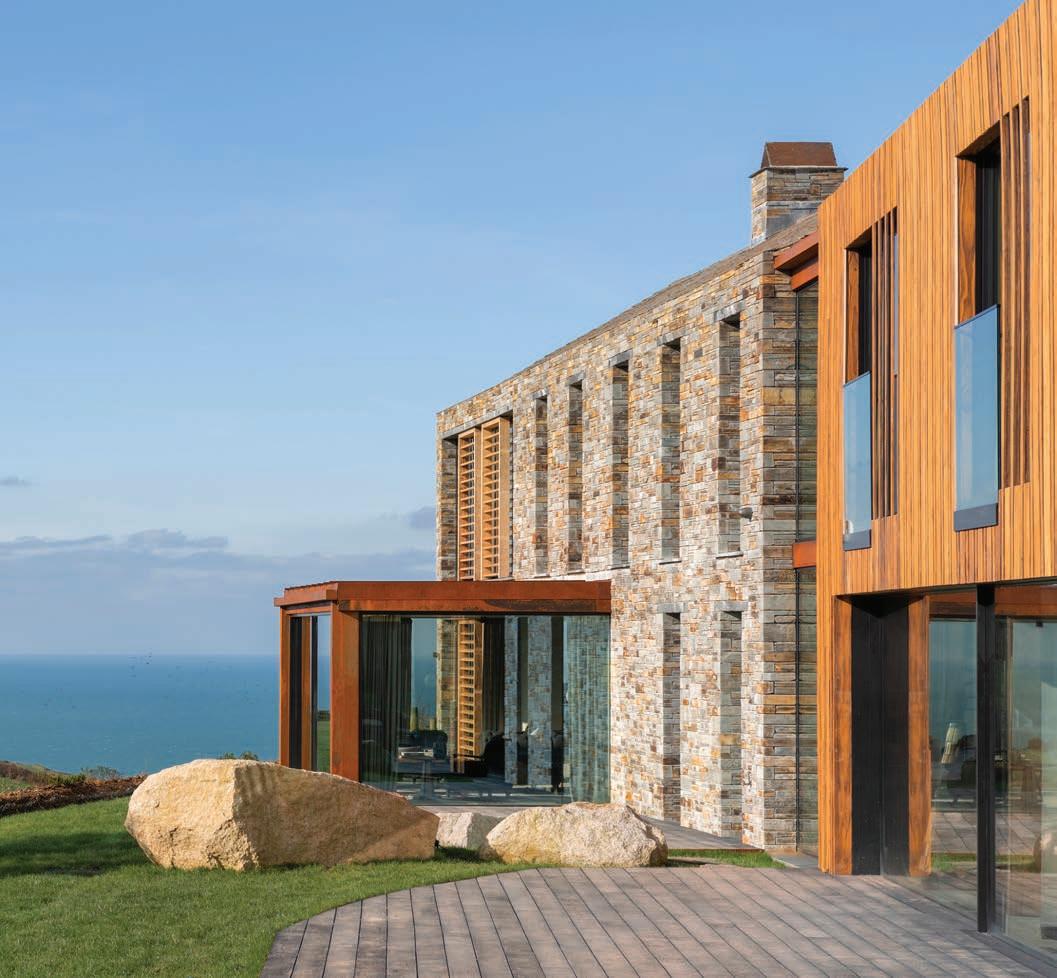
Woodford Architecture and Interiors are homemakers.
By seamlessly combining architecture, interior design and landscape design we transform houses and deliver homes that are designed to suit you, your lifestyle and the environment.
We create timeless, functional and engaging spaces that make daily life more pleasurable, and curate spaces that awaken the senses and enhance wellbeing.
With a wealth of experience and local knowledge of tradespeople and contractors in Devon and Cornwall, we have a reputation for quality and exceeding our clients’ expectations.
15 North Street, Ashburton, Devon, TQ13 7QH Tel: 01364 654888 www.woodfordarchitecture.com

1. the act of driving something along
. the flow or the velocity of the current of a river or ocean stream
. to become driven or carried along, as by a current of water, wind, or air
. to move or float smoothly and effortlessly
We invite you to continue your lifestyle voyage online. Find inspiring stories and uncover more luxury content on Instagram @driftcornwall. Join our exclusive e-journal community at drift-cornwall.co.uk to receive recipes, reviews and insider knowledge of some of Cornwall’s most-loved luxury destinations.
driftjournal.co.uk
driftcornwall
A JOURNAL FOR THE DISCERNING
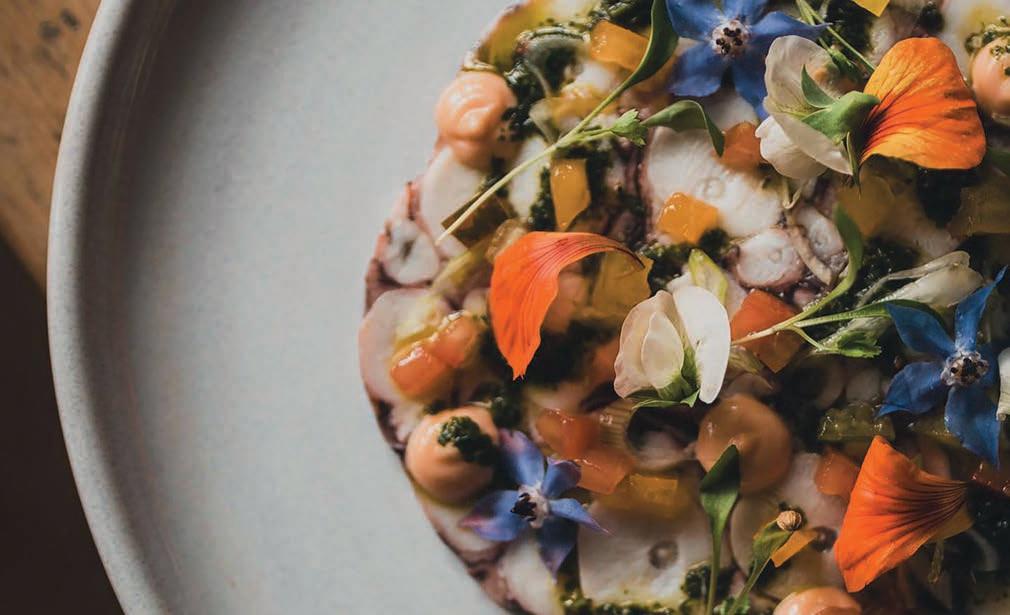



On the cover
Cornish octopus carpaccio, heritage tomato, spring onion and coriander from Nancarrow Farm, as featured from page 28. Image ©Adam Sargent. nancarrowfarm.co.uk
Head of Client Management es lover –
des.glover@levenmediagroup.co.uk
Partnership Executive lly urnard –elly.burnard@levenmediagroup.co.uk
CEO en ratchett –ben.pratchett@levenmediagroup.co.uk
Chairman & Founder ndy Forster –andy.forster@levenmediagroup.co.uk
PROUD TO BE PART OF

is published by:
Engine House Media LTD
Holbrook, The Moors, Porthleven, Cornwall T
www.enginehousemedia.co.uk
www.levenmediagroup.co.uk
ISSN 2632-9891
© All rights reserved. Material may not be re-produced without the permission of Engine House Media Ltd. While ri will take every care to help readers with reports on properties and features, neither Engine House Media Ltd nor its contributors can accept any liability for reader dissatisfaction arising from editorial features, editorial or advertising featured in these pages. Engine House Media Ltd strongly advises viewing any property prior to purchasing or considerations over any financial decisions. ngine House Media reserves the right to accept or reject any article or material supplied for publication or to edit such material prior to publication. Engine House Media Ltd cannot take responsibility for loss or damage of supplied materials. The opinions expressed or advice given in the publication are the views of the individual authors and do not necessarily represent the views or policies of
Editor Hannah Tapping
hannah.tapping@levenmediagroup.co.uk
Creative Designers
Spencer Hawes
amie Crocker
Finance & HR Manager
Charlotte Forster
charlotte.forster@levenmediagroup.co.uk
Credit Control
Tracy art –tracy.dart@levenmediagroup.co.uk
Engine House Media Ltd. It is suggested that further advice is taken over any actions resulting from reading any part of this magazine.
Engine House Media Ltd is a multi-platform media business with a passion for everything Cornish. Visit www.enginehousemedia. co.uk to find out more. ur mission is to create W TC I NC media opportunities marrying together consumers with the fabulous businesses across Cornwall. ur publishing and marketing teams are specialists in creating print and online communications, devised to achieve a range of marketing objectives. With over 20 years of marketing, brand management and maga ine experience we develop effective communications that deliver your message in a credible and creative way. We operate across all media channels, including: print, online and video.
cross the South West, a quiet shift in culinary identity is taking place. A new generation of chefs is redefining the region’s food culture, eschewing convolution and complexity in favour of honest flavours and placing sustainability at the heart of their kitchens. Excellence now stems not from extravagance, but from restraint, with a renewed focus on locality, seasonality and the integrity of ingredients. From coastal kitchens to rural restaurants, these chefs are forming close relationships with growers, fishermen and producers, championing provenance while crafting dishes that feel both contemporary and deeply rooted. Take two hotels that lie at the heart of Cornwall’s gastronomic landscape The reenbank and The lverton . With a finger firmly on the pulse when it comes to seasonal flavours, and a reputation for subtle
combinations reflected in carefully considered menus, each dish is made to showcase the very best of what’s available nearby. Nancarrow Farm follows a similar philosophy their own ed evon cattle provides carefully selected cuts of dry aged beef for the wood fires while two acres of fruit, veg and herbs provide hyper-local ingredients with incomparable texture and flavour. t Mackerel Sky Seafood ar , morning conversations with fishermen determine the day’s offerings, ensuring that what reaches the plate reflects the sea’s daily rhythms rather than commercial convenience. While at hilleigh Way Cookery School , upert Cooper’s approach to food education is pragmatic and unpretentious. picure is an exploration of an evolving landscape, where the future of food is being shaped by thoughtful hands.






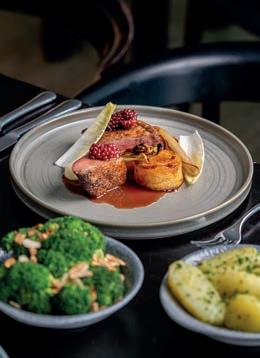



































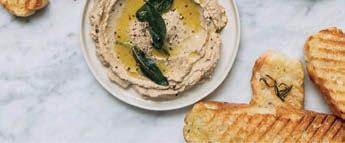





42 A CULINARY EVOLUTION
Seasonal dishes served with a side of wellness at St Michaels Resort
Two hotels at the heart of Cornwall’s gastronomic landscape; The Greenbank and The Alverton
Situ, where modern Indian cuisine encounters Cornwall s finest seasonal produce
Verdant Brewing Co. maintains an uncompromisin focus on a our, consistency and innovation
Nancarrow, in rural Cornwall, is a place where nine generations have tended the land
Jake Grove’s culinary journey spans continents, but finds its still point in Cornwall as head chef at St Moritz Hotel
From London lights to Cornish waters, Mackerel Sky captivates coastal appetites
ota and ota ai are spaces of uidit where a ours and ideas mer e, shi and suddenl evolve with ease
48 FIRE, FOOD AND FLAIR
Rupert Cooper elevates the Cornish dining experience at Philleigh Way Cookery School
50 OCEAN TO TABLE É CLAT
he are, one of Cornwall s finest coastal hotels elevates seafood dining to new heights 56 HUMBLE ORIGINS
From an impulsive solution to a county-wide phenomenon, Baker Tom’s legacy turns twenty
58 A TRUE TASTE OF THE ISLAND
he rein ention of an a ernoon classic on St Michael’s Mount is receiving much acclaim 64 INFUSED WITH ELEGANCE
eor ian charm meets modern comfort and fine dining at the Penventon Park Hotel
72 ON THE BEND OF THE RIVER
Set in 65 acres of glorious gardens and woodlands, he udock ean o ers a place of rest, rela ation and repast
74 EVENTIDE
The last word from St. Ewe Free Range Eggs






WORDS BY HANNAH TAPPING




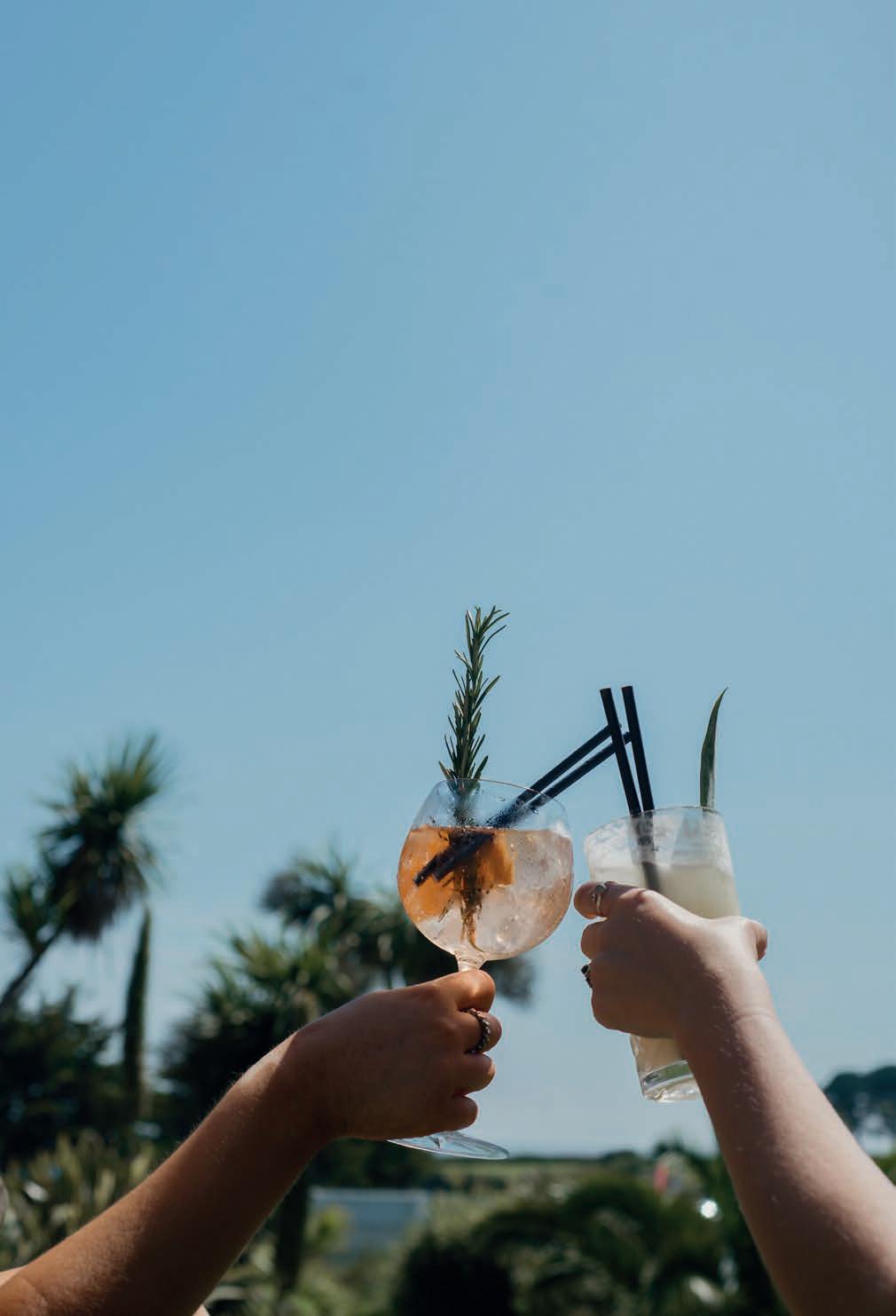
Laid-back oceanside luxury, where seasonal dishes served with a side of wellness are the order of the day.
You’ll find St Michaels Resort just steps from the crescent-shaped white sands of Gyllyngvase Beach in Falmouth. The saltkissed Atlantic breeze whispers along the shoreline and through the palms. Set back from the sheltered bay, elevated just enough that views capture the sparkling, Cornish waters beyond, St Michaels Resort isn’t just a coastal retreat, it’s an invitation – to indulge, to restore and to savour every second spent here.
for the seasonal and sublime or you seek the serenity of a spa, St Michaels offers uncompromising luxury.
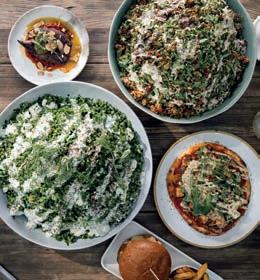
The grounds bloom in sub-tropical splendour, the sea glitters with promise creating the perfect backdrop for a place where dining and wellness combine in perfect harmony. Whether you’re a gourmand with a taste
There’s something undeniably grounding about being by the sea. The salt in the air. The rhythm of the waves. The way the horizon reminds you to breathe a little deeper. St Michaels Resort has captured that essence and woven it into every corner of its experience, from the food on your plate to the warm stones beneath your back during a massage.
The resort’s architecture makes the most of its location. Sea views stretch endlessly beyond tall windows, and inside, a palette of coastal tones and natural textures creates a seamless blend between indoors
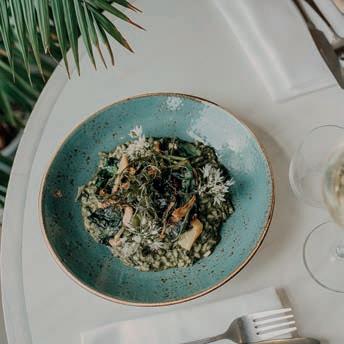
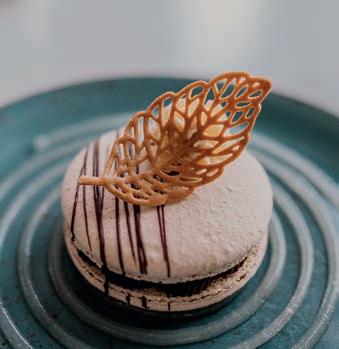
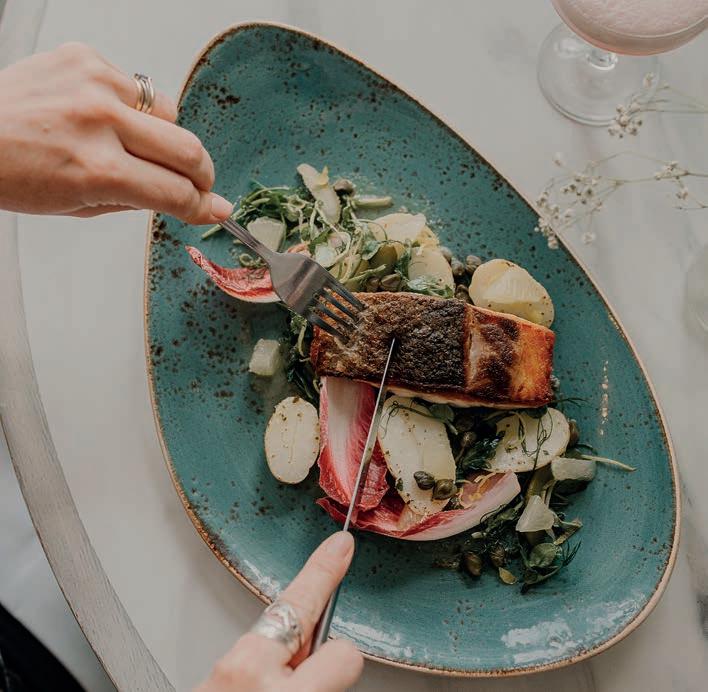
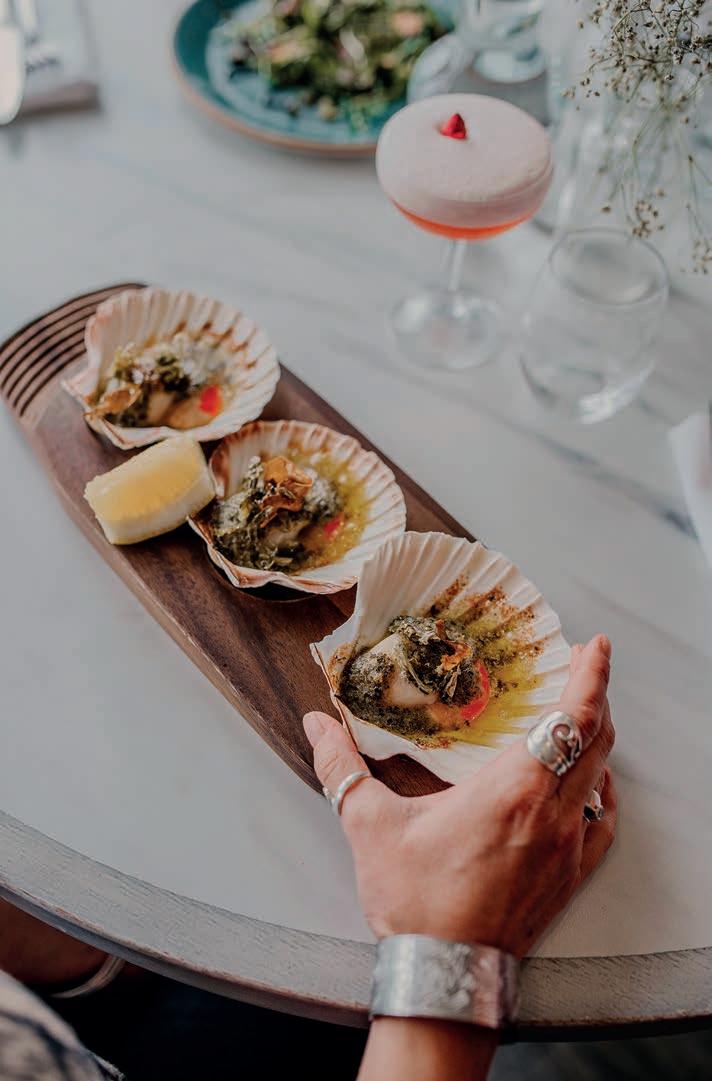
and out. It’s not hard to see why this place is adored. However, what truly elevates St Michaels is its ability to satisfy the senses.
Already very much on Cornwall’s foodie map, St Michaels has always been at the forefront of sourcing local, with seasonal, flavour-filled ingredients supplied by the South West’s best suppliers. A culinary collaboration with acclaimed chef Stephane Delourme, has brought a fresh vibrancy to the menus. With experience spanning some of the finest kitchens, Stephane’s food is deeply rooted in classical technique, yet entirely unpretentious. His dishes aren’t about showing off, they’re about showing care. The new menus are thoughtful, seasonal and ingredient-led, with produce sourced across the South West. There’s a distinct reverence here for the local, with nearby fields, farms and fishing boats shaping each dish.
There are two dining options at St Michaels, each maintaining the same ethos of honesty and high quality while having their own distinct flavour, and both affording the kind of welcome that makes you feel like a returning guest, even if it’s your first visit. At Brasserie on the Bay, you’re treated to fine dining with the warmth of a Cornish welcome. Intimate and elegant without being fussy, the Brasserie on the Bay leans into British classics, reinvented with flair. Think seared Cornish fillet of hake, samphire, pickled
courgette, roasted tomatoes, pomme purée and basil oil; whole plaice simply grilled with ginger, chilli, lemon, garlic butter, Cornish new potatoes; or Brian Etherington’s pork belly with caramelised apple purée, salsa verde and frisée. Perfect for that special dinner, the Brasserie on the Bay team are experts in local food and fine wine, always on hand to share their passion for each dish, be that their ingredient knowledge or recommendations for a delicious wine pairing. I’m told a glass of Camel Valley Brut makes the ideal accompaniment for perusing the menu.
If the Brasserie on the Bay is your go-to for an elegant dinner or a long, celebratory lunch, then Nourish should be your daytime sanctuary. Bathed in natural light and brimming with greenery, it’s the sort of place that feels like a deep exhale. Backed by views to the bay beyond, it’s a café by day and a relaxed bar-restaurant by night. Nourish is where spa guests wander in wrapped in robes and no one bats an eyelid.
The menu is vibrant and wholesome, offering feel-good plates that satisfy both palate and soul. There’s something wonderfully grounding about eating a wood-fired pizza with delicious toppings while looking out over grounds and the ocean beyond. Small plates encourage sharing, conversation and lingering a little longer – why wouldn’t you when butter bean hummus, spiced cauliflower taco

ABOVE Nourish, a place to refuel and reset
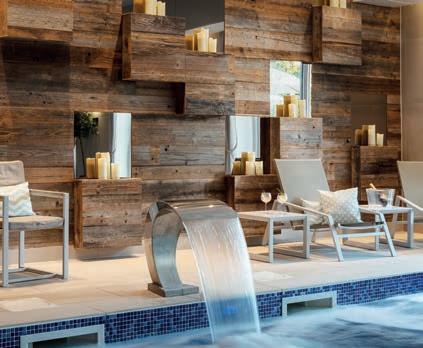


ABOVE
and grilled Cornish red mullet are on the menu? From crisp seasonal salads and Cornish crab to the kind of smash burger that calls for two hands, Nourish has a quiet confidence about it. It doesn’t try too hard; it simply does things well.
The culinary offering at St Michaels is only half its story. The other half is waiting beneath the surface – quite literally – in the warm waters of the South West’s largest hydrothermal pool and its adjacent stunning spa garden. The St Michaels spa experience is like stepping into another dimension. Time stretches. Noise softens. The outside world fades away. Its foodie spa days have become something of a signature. Whether you’re booking in for a special occasion or treating yourself just because you can, these packages make it easy to enjoy the best of both worlds. Choose a two-hour hydro session followed by a two-course lunch in Nourish. Or indulge in a massage and then dine by candlelight in the Brasserie on the Bay. You can even curate your own experience – because St Michaels knows that everybody (and every appetite) is different.
Perhaps begin with the Hydrothermal Experience: a two-hour journey through a series of carefully curated thermal
zones designed to soothe, refresh and restore. There’s a kind of choreography to it all – start with a slow float in the hydrotherapy pool, then move through steam rooms laced with essential oils and settle in for a detox in the Finnish herbal sauna. For those seeking contrast therapy, brave the outdoor icy plunge pool before rewarding yourself with the sea view hot tub, glass of fizz in hand. A barrel sauna and loungers offer a chance to bask in the elements, whether under blue skies or a Cornish mist. Here you’ll find your coastal sanctuary, whatever the weather.
Then it’s time to step inside to the treatment rooms which offer a cocoon of calm. Expert therapists tailor massages, wraps and facials to exactly what your body craves. Whether it’s a nourishing and fragrant body wrap or a grounding full-body massage, each treatment feels personal. Designed for both results and ritual, this is the kind of spa that doesn’t just pamper, it transforms.
So, whichever way you are looking to nourish body, mind or soul – whether that be for a solo reset, a romantic escape or a day of laughter and lunch with friends – St Michaels is the place to be.
stmichaelsresort.com







WORDS BY ROSIE CATTRELL








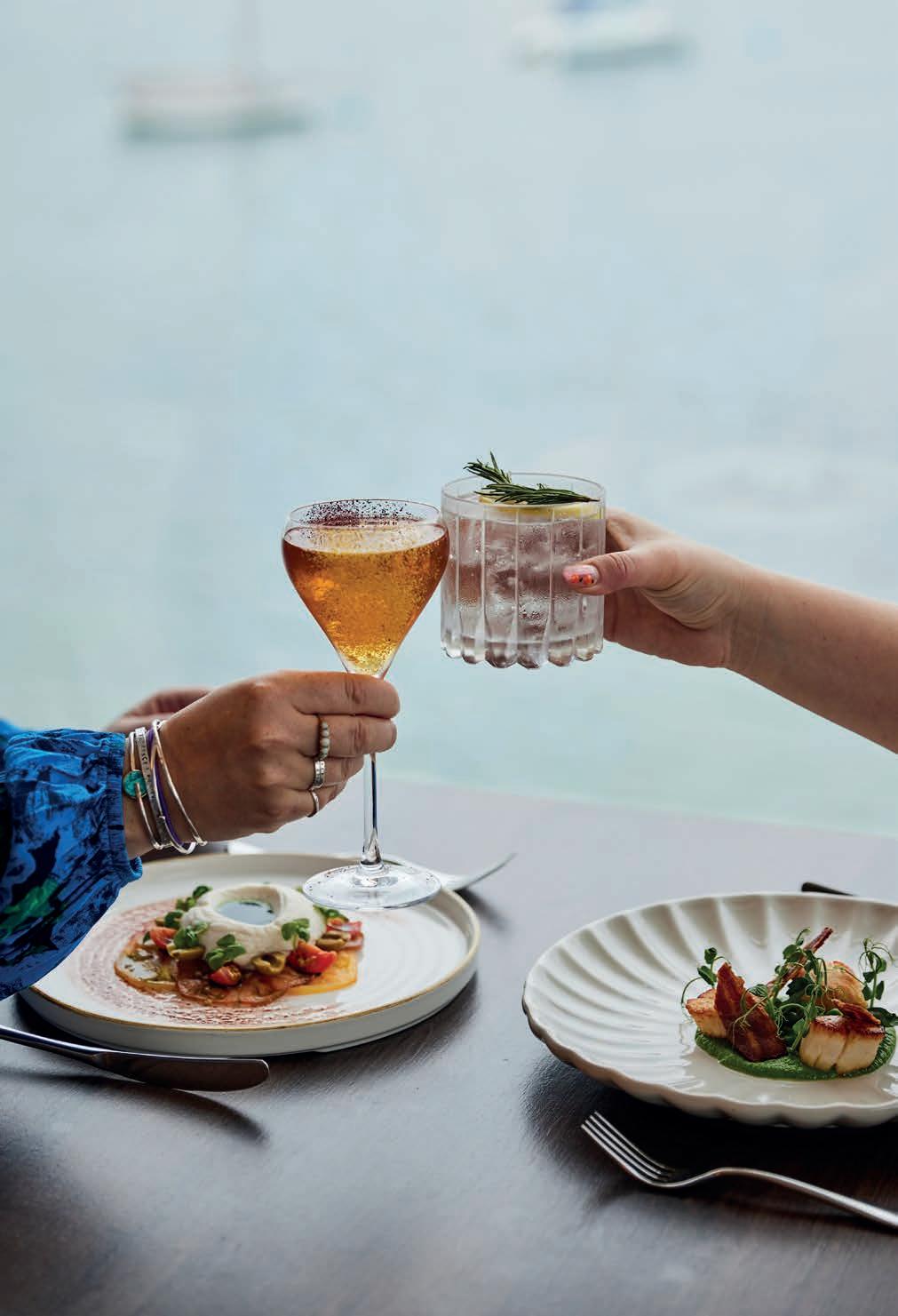
At the heart of Cornwall’s gastronomic landscape lie two hotels, each with a unique cu inary o ering t at ig ig ts t e very best of t e region s nest ingredients.
It’s well understood that Cornwall’s opal waters and sun-kissed summer landscapes draw visitors from around the world every year. Endless days exploring secret trails and sand-strewn beaches, the glitter of blue saltwater tempting bare toes, is a daydream that often drifts into focus when Kernow comes to mind. Cobbled streets lined with unique local businesses provide fresh reflections of an ever-irresistible human curiosity. Luxurious spaces in which to lay your head afford moments of feeling like this could be home. But, at the heart of it all awaits an eye-opening gastronomic landscape that is sure to leave a lasting impression on those who know where to look.

One such encounter lies in wait on the very edge of the River Fal, overlooking the tranquil harbour scenes of Falmouth. Under the expert gaze of the Cornwall Hotel Collection, The Greenbank’s historic riverine setting and lavish harbourside rooms come perfectly paired with a wonderfully immersive Cornish culinary experience.
Inspired by an everchanging larder of fresh local produce, the hotel’s aptly named Water’s Edge restaurant invites guests and visitors to take a seat at the table for a little taste of Cornwall. In a place where simplicity is not mistaken for the mundane, Head Chef Bobby Southworth, alongside Executive Chef Nick Hodges, has
PREVIOUS
A table at the Water’s Edge, The Greenbank
Head Chef Bobby Southworth, alongside Executive Chef Nick Hodges
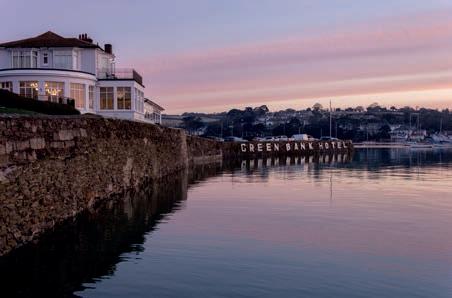
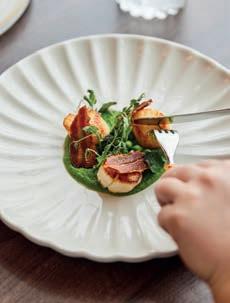


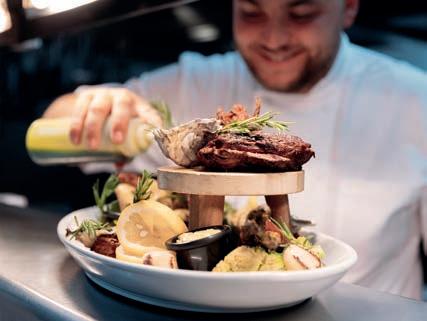
his finger firmly on the pulse when it comes to seasonal flavours, and his reputation for subtle combinations is reflected in carefully considered menus, each made to showcase the very best of what’s available nearby. “We like to lean into ingredients that are naturally available at the time,” Bobby explains, “seeking out flavours that reflect the seasons – think classic dishes with a twist, built with ingredients that complement each other.”
Cornish seafood freshly plucked from local waters is often the star of this show, and what could be a better setting to experience it as the river eases gently by? Bobby’s latest menu features the subtle sweetness of grilled scallops and the rich, creamy familiarity of moules marinière, best paired with a sip of chilled white wine and a salty sea breeze from a seat on the terrace. Curry roasted monkfish, crisp fish and chips, and the always popular catch of the day are each perfect examples of Cornwall’s wonderful ocean bounty.
Locally reared meat is also given a spotlight in the Water’s dge, from confit pork belly and lamb with wild garlic, to a classic fillet steak cooked bespoke to your liking, with fresh vegetables from across the river to round it all off. uxurious afternoon teas crafted by in house astry Chef aron awlings afford a moment of decadence, and the essert’s n s’ offer means a two-course lunch is served Monday to Saturday for £24 with a free sweet treat – accompanied, as always, by first class service and an endless coastal vista.
Cornish born and raised, Bobby’s face is well known in these parts, and his sellout ‘Bobby’s Taste of Cornwall’ events have become a must-attend occasion for many. “These are my favourite events to do,” he continues. “I get to spend a whole evening with my guests and share what I love doing with them. It’s about showcasing what we can do here in Cornwall with the ingredients that we’re so lucky to have around us. That’s what it’s all about – I just love talking about food!”
Just half an hour away, in a hidden hillside location in the heart of Truro, another of the Cornwall Hotel Collection’s historic hotels harbours its very own foodie experience. Shrouded from the hustle and bustle of Cornwall’s own cathedral city by ancient trees and fairy-tale grounds, The Alverton’s original Grade II-listed architecture dates as far back as 1830. Now a luxury hotel, an old-world charm and a sense of romance roams free about the gardens here, with a sweeping sun-trap terrace made for leisurely moments with a glass of something cool and crisp.
renowned culinary offering under the guidance of Nick Hodges and Head Chef Ollie Wyatt calls guests and locals alike to take a seat in the garden-view restaurant. With fine regional food at the heart of it all, the menus at The Alverton, much like the Water’s dge, are crafted around celebrating good Cornish ingredients from local suppliers.
“We like to try and keep things as simple as possible,” Ollie shares, “whilst playing on the incredible natural flavours that we’re afforded living here in Cornwall. While everything on your plate is carefully considered, we like to take the fuss and pomp away from the food, so all that’s left is incredible flavours that speak for themselves.”
From smoked mackerel pâté and caramelised pear and goat’s cheese ravioli to marmalade glazed gammon, slow-cooked beef bourguignon, and coconut laksa with fresh white fish and prawns, Ollie’s latest menu is brimming with seasonal flavours. With their own indulgent edition to bring to the table, an lverton afternoon tea experience is one that comes with quiet garden ambience and a feeling of laid-back civility.

Not one to shy away from a spot of al-fresco cooking, you’ll often find llie barbequing out on the terrace on Friday evenings throughout the summer, the rich smoky scents of grilling meats, fish and veggies tempting all tastebuds nearby.
And no summer at The Alverton would be complete without its famed Lobster on the Lawn event. Friday 13th June will see a true celebration of Cornish seafood take place in the form of a lobster feast with all the trimmings, served on the sun-dappled terrace with a glass of bubbles.
Another date for any foodie’s diary is Ollie’s ‘Hedgerow and Field’ Taste of Truro evening on Thursday 19th June. In a showcase of all things veggie, this intimate tasting evening will cast a spotlight on Cornwall’s abundant natural larder. From earthy purple-pink beetroot and nutty, sweet celeriac, to powerful mint and tart gooseberries, each plant’s unique flavour properties are appreciated and thoughtfully cooked to extract the very best from each local ingredient. “It’s events like these that mean I can really throw myself into my menus and spend some time interacting with my guests,” Ollie admits. “I can get a real understanding of everyone’s tastes and let them into my world of flavours and combinations.”
From the quiet tranquillity of The Greenbank’s sheltered waters to the enchanting seclusion of The Alverton’s secret city oasis, it only takes one moment from the seat of a restaurant table to uncover a culinary revelation that was never really a secret at all, once you know where to look.
ead to t e ote websites for more information and to secure your seat at the tab e, w et er you re boo ing in for one of t e cu inary events ta ing p ace t roug out t e year, or ma ing a reservation for unc , dinner or a ernoon tea.
greenban ote .co.u t ea verton.co.u

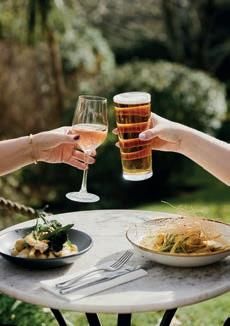
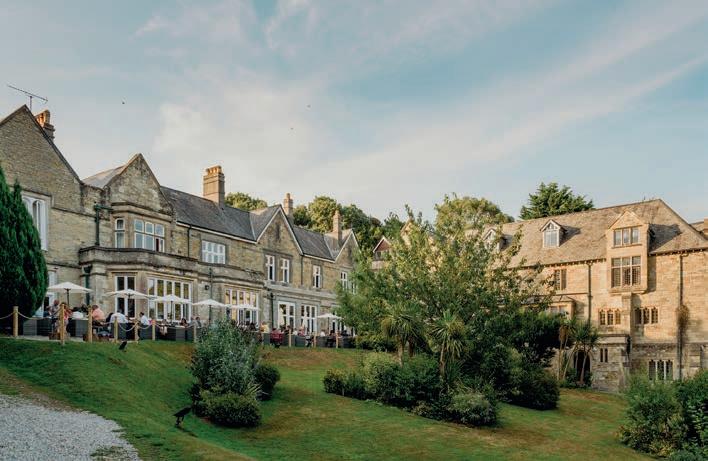
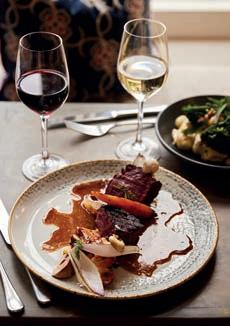
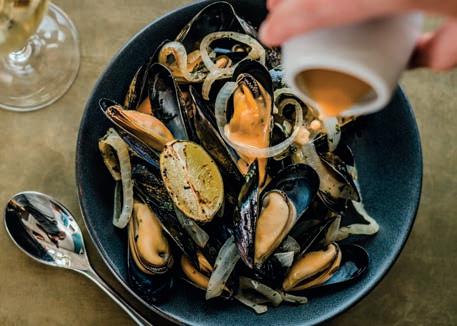
WORDS BY JAMIE CROCKER
Where modern Indian cuisine encounters Cornwall s finest seasonal produce in Penryn.
At the end of a river, you’ll find Penryn, and along its Commercial Road, is Situ – a place that has raised the bar in the world of café culture. The name, meaning ‘environment’ in Sanskrit, perfectly encapsulates what joint owners Sham and Alexa have created: a space where exceptional coffee, innovative cuisine and community connection merge to form an experience that you’d be hard-pushed to find this side of Bristol.
Situ’s story begins with two passionate individuals from different corners of Britain. Sham, originally from Leicester with Gujarati heritage (his parents having fled Uganda during Idi Amin’s regime , and Alexa, a native Cornishwoman, met while working in London’s hospitality scene. When they relocated to Cornwall in 2019, just before the pandemic, they started with a modest coffee van and hosted pop-ups and supper clubs. In , they established their permanent base by taking over the former Origin warehouse in Penryn, transforming it into what they proudly describe as a ‘high speciality coffee shop.’
What distinguishes Situ from typical cafés is their commitment to quality sourcing. While the term ‘farm-to-table’ has become commonplace, Situ elevates this concept with extraordinary dedication. “Our nearest supplier is literally point three miles away,” Sham enthuses. “Only the muddy beach separates the back of our building from the slopes of their farm.” This proximity allows them to adapt their menu frequently based on what’s available – when the farmer mentions leeks are out of season, the menu changes accordingly.
The caf balances casual dining with refined execution. Guests enjoy counter service in a clean, minimalist space with Scandinavian influences, but the food that arrives at their table reflects Sham’s culinary craftsmanship. His background as a chef, exposed early on to Gujarati cooking by his mother, informs Situ’s unique offering: modern Indian cuisine utilising Cornwall’s exceptional ingredients.
Perhaps most remarkable is their direct trade partnership with MV Spices, in
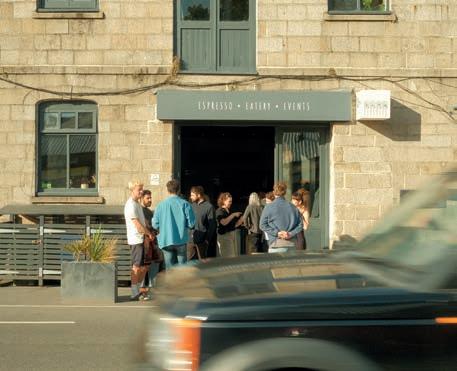
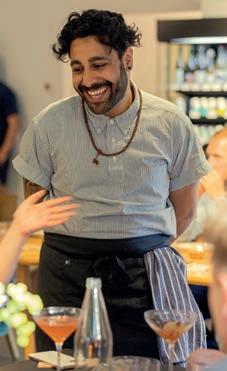
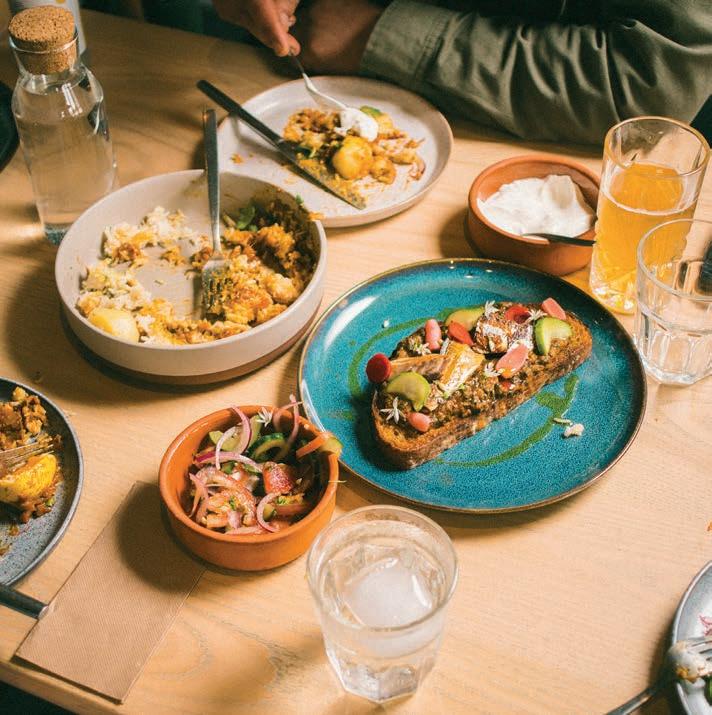
Jodhpur, India, a female-led concern run by seven sisters who took over their late father’s spice company. “It’s important,” Sham emphasises, “because in India, it’s still a very male-dominated area, so we are supporting a business that is essentially making a change in a different economy.” This connection not only ensures authentic flavours but also aligns with Situ’s ethos of supporting progressive businesses.
Sustainability shapes every aspect of Situ’s operation. They have a nose-to-tail approach to sourcing meat, ensuring utilisation of the full carcass for their menu and events. They encourage a zero-waste mindset by promoting the use of re-usable cups and carry this practice through into the kitchen by making ingredients such as ricotta produced from excess steamed milk. These practices reflect their philosophy of building a business with authenticity, integrity and purpose.
Unlike many seasonal establishments that capitalise on Cornwall’s tourist influx before closing for winter, Situ remains open year-round, serving locals seven days a week. “We only close on Easter


Sunday and between Christmas and New Year,” Sham notes. This consistency has fostered strong community bonds. Beyond serving exceptional food and drink, Situ creates space for cultural exchange.
They regularly host celebrations for Eid, Diwali and other cultural festivals, introducing Cornish residents to traditions from the Indian subcontinent. Sham can also be engaged for private dining at events, from weddings to birthday celebrations for a fully curated dining experience. “We’re enriching the local area with multicultural experiences,” Sham explains, bringing a slice of vibrant diversity to Cornwall.
The café also supports local talent by displaying team members’ artwork and crafts. They host the Shakeout Run Club on Saturday mornings and maintain a community notice board. These initiatives reflect Situ’s vision of being more than just a place to eat and drink; it serves as a gathering spot where people connect. And, for those seeking exceptional coffee, innovative cuisine, and genuine community spirit in Cornwall, it provides a distinctive environment where all three flourish together.
situcafe.co.uk












Proudly independent and producing hop-forward beers in Cornwall since 2014, Verdant Brewing Co. maintains an uncompromising focus on flavour, consistency and innovation.







For over a decade, Verdant beers have been poured in over 1,000 venues across the UK and exported to more than 20 countries worldwide. Inspired by hazy, hop-forward US beers that weren’t available in the UK back then, Verdant has become one of the country’s most admired breweries, allowing its team to challenge conventions and inspire a spirit of independent creativity. Verdant’s freshest beers – juicy, ha y, and unfiltered – are also available in over 150 pubs, restaurants and bottleshops across Cornwall.
First brewed in 2015 on the original Falmouth site, Lightbulb is Verdant’s flagship xtra ale le . that’s remained unchanged in recipe and unwavering in character ever since. s pale as a 100-watt light bulb, but as juicy as an I . Sessionable, quenching and moreish. Lightbulb has a biscuity malt base with a subtle bitterness, all drenched in fruity hops, and a finish that beckons another glass. Brewed using the very best hops sourced from the US, they provide that signature aroma bright, citrusy, lifted, and gently resinous. Whilst Lightbulb is
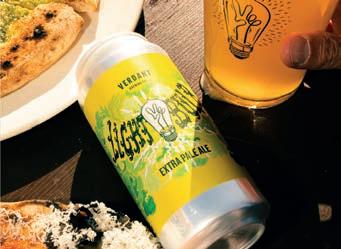

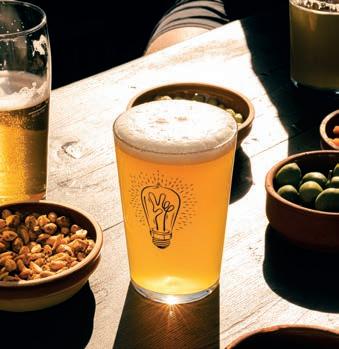
erdant’s most popular ale le, fresh beers are brewed weekly, with new beer drops regularly selling out fast on the Verdant webshop.
Lightbulb is also served at each of erdant’s own four venues. t the erdant Taproom in enryn, the freshest beers are poured metres from where they’re brewed. Schooners, a spectacular sea-facing hideaway in St gnes, pairs pints with crashing surf and Neapolitan sourdough pizzas. In Falmouth, the newly renovated Seaview Inn offers a proper community pub feel, with bold, authentic Indian dishes in the desi-inspired kitchen, while The Seafood Bar brings together the freshest local catch, served tapas-style in an intimate setting.
Lightbulb isn’t just a beer, it enlightens; igniting your imagination and opening doors to the wider Verdant world.
Discover your own spark of inspiration, your ‘Lightbulb’ moment, this summer in Cornwall.
verdantbrewing.co
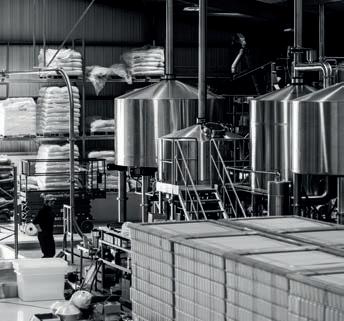
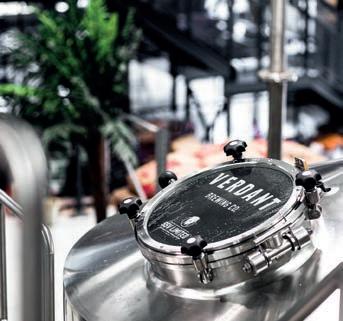

WORDS
BY JAMIE CROCKER
Enter a world where nine generations have tended the land in rural Cornwall.
In a quiet valley just minutes from Truro, Nancarrow Farm invites visitors down a long track lined with centuries old oaks, offering glimpses of gardens, orchards and livestock before revealing its historic stone barns. Since 1782, this 100-acre farm has been lovingly tended by the same family, who now blend organic food production with exceptional dining experiences.
The journey to Nancarrow feels like stepping away from modern pressures into a bygone age – this is a landscape that has been thoughtfully managed for generations. The farm’s connection to its customers stretches back decades before opening their dining barns in 2014, the family sold their produce at local farmers’ markets, establishing a tradition of direct consumer relationships that continues today.
t the heart of the Nancarrow experience is the courtyard, transformed from a practical farm space into “a magical spot, steeped in history.” The courtyard dining area centres around a wood fired kitchen where guests can watch chefs at work, creating what really can be described as culinary theatre – the visual spectacle of food preparation
combined with enticing aromas over slowburning oak and home-made charcoal.
“The courtyard set up exposes us in a good way,” explains head chef, ack. “It’s a multi purpose set up, which might feature slow smouldering cuts of meat, ember roasted veg, grilled seafood or even woodfired pi as, while our bread is baked in our bakery just before service and is allowed to rest in full view, so everybody can see it – pretty much everyone comes and has a look.”
Their native Red Devon cattle enjoy an idyllic life roaming between the farm and the nearby Penhale Dunes conservation project. When their time comes, they make their final journey to the farm’s on site facility where the carefully selected cuts are dry aged for up to days in the butchery.
This transparency extends to their philosophy about ingredients. The team grow around two acres of fruit, veg and herbs each year. “The difference between something that’s picked fresh and put on the plate that day is incomparable,” notes farmer and partner, Steve. “The crunch of the lettuce or sweetness of a tomato is completely different.”
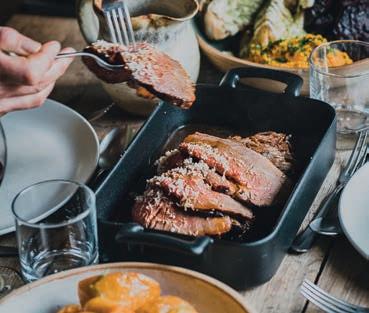
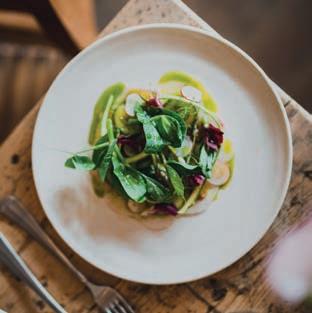
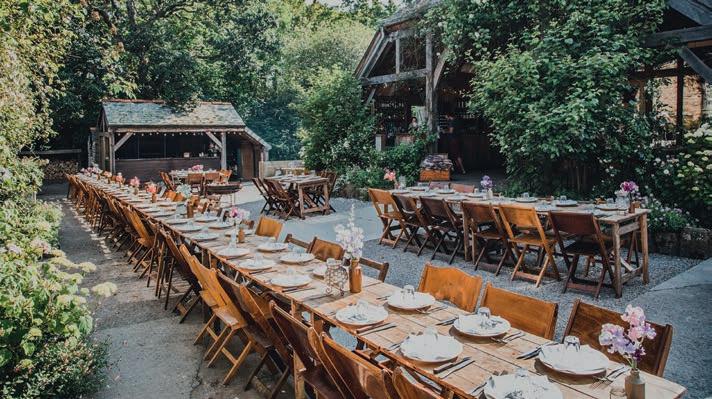
The cooking approach focuses on enhancing natural flavours rather than masking them. sing different stages of fire – from high flames for searing to gentle embers for slow cooking –allows ingredients to shine. ven simple produce like peas or tomatoes become headline attractions when gently smoked over the wood fire. Menus change with what’s growing in the gardens, orchards and hedgerows. Dishes are designed to be familiar but with thoughtful twists that reflect the surrounding landscape. During their monthly feasts, chefs talk diners through each course, explaining the journey from farm to plate.
This authentic attitude to sustainability arises naturally rather than serving as a marketing strategy. Solar panels, waste reduction and circular practices are adopted because, as Steve puts it, “When you hang up your boots at the end, you want to be proud of what you’ve accomplished.”
For visitors seeking genuine Cornish farm dining, Nancarrow offers not just excellent food but a connection to place, tradition and the rhythms of the rural calendar.
nancarrowfarm.co.uk



WORDS BY JAMIE CROCKER






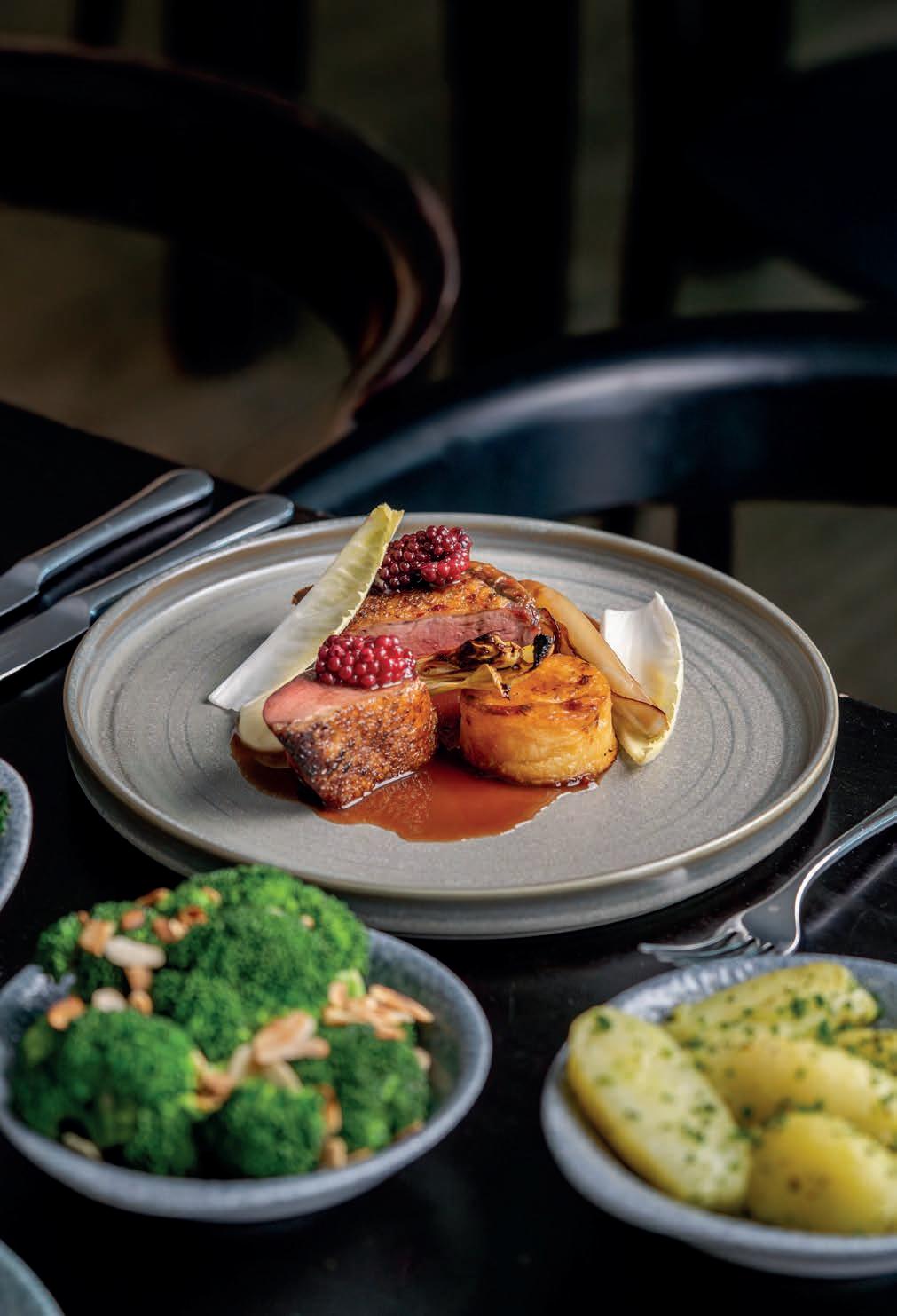
Jake Grove’s culinary journey spans continents but finds its still point in Cornwall, as head chef at St Moritz Hotel.
The first kitchen that took him in wasn’t a temple of haute cuisine, but a place of honest cooking and character. The Port William Inn, just south of Tintagel, a pub at the water’s edge, where beer glasses clinked, and the scent of salt and ale filled the air. He didn’t choose it, not exactly –his father came home one night and informed him he had a job to go to the next morning. Seventeen years old, he turned up, stepped into the heat, the steam, the sudden and necessary urgency of service and never left the kitchen again.
is a place where instinct meets discipline, where a dish is only as good as the last set of hands that touched it.

For Jake Grove, cooking is not a profession in the way that law or medicine are. It’s something more visceral, something that roots itself in the hands, the senses. He learned early that a kitchen
It was this understanding – this immersion in the necessity of craft – that carried him to the Driftwood Hotel, a name that conjures images of gentleness but belied the unrelenting focus inside. Under the command of Chris Eden, Jake discovered that to cook at a certain level is to accept that there are no easy days. He took from that kitchen the rigour, the reverence for produce, the understanding that ingredients tell a story before a knife is even laid upon them. That, and the work ethic: the knowledge that excellence does not happen by accident but by design, through graft and repetition and a refusal to let standards slip.
The pursuit of technique carried him beyond Cornwall’s shores. New York and Sydney. The structured intensity of Sepia, the breadth of influences, the way a dish could be layered with the accents of different continents without ever losing itself. More than the food, though, it was the people – the shared language of the kitchen, spoken in a hundred accents, sharpened in the heat of service. It taught him how to lead, how to recognise the strengths of his team, how to step back when necessary and let someone else take the reins.
It was no surprise that St Moritz Hotel called him back to these shores. He had grown beyond them once, left to test his skills elsewhere, but things had changed. A new leadership, a renewed vision. Now, as Chef de Cuisine, the challenge is not simply to run a kitchen, but to define its identity.
bass and mackerel from Bro Diplock’s boat off Rock, whole Cornish lamb from Kittows Butchers in Fowey. The raw materials are the story, and Jake’s job is to listen, to shape, to let the produce speak for itself.

At The Shorecrest Restaurant, menus do not dictate to ingredients; they form around them. A dish begins not with an idea but with what is at its peak, what is being pulled from the ground, hauled from the water. Vegetables come from Restharrow Farm, just a stone’s throw from the hotel. Asparagus from St Enodoc,
He is not interested in theatrics for their own sake, nor in complexity without purpose. He looks instead for clarity, for restraint, for the moment when a dish is balanced enough that nothing further needs to be done. It is an approach that extends beyond Shorecrest to the Seaside Pool Club, where the emphasis is on laid back dining –the kind of food that sits perfectly within its setting. Here, the cooking does not compete with the view or the sea air; it enhances them. Last year’s Sunset Soundwaves events, with live music and sharing BBQ menus, captured something of the relaxed generosity that Jake wants to encourage – food as experience, as something shared rather than merely consumed.
There is no pretence in his kitchen. No aggressive hierarchy, no misplaced ferocity. “We try not to be overly intense in the kitchen,” he says. “When it’s intense, it’s because we’ve made a mistake and
Afternoon Tea

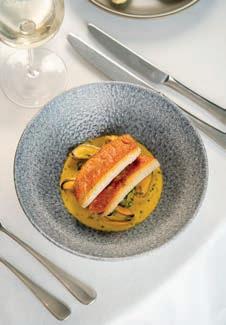
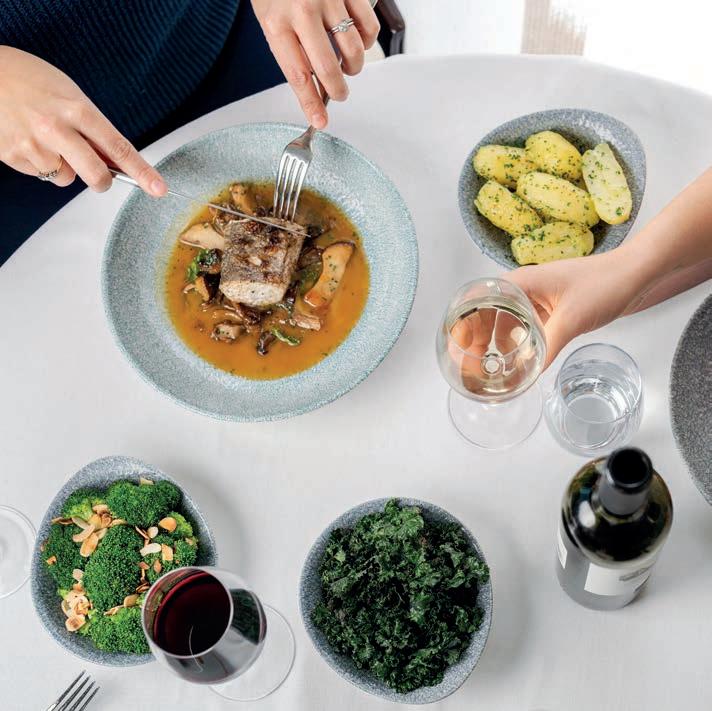
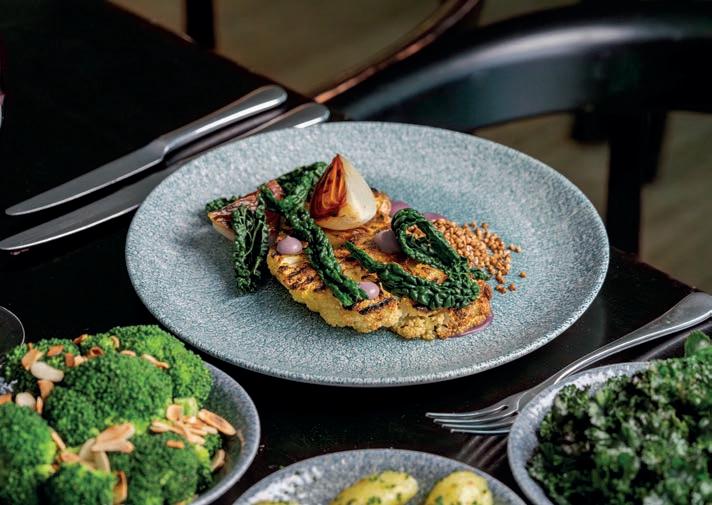
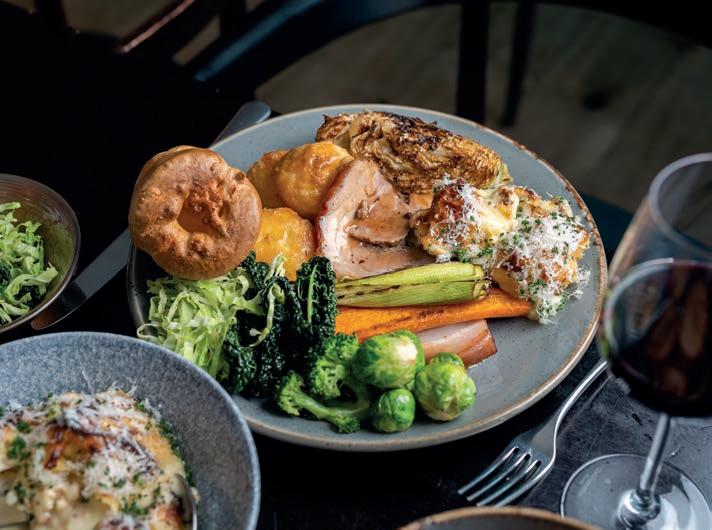
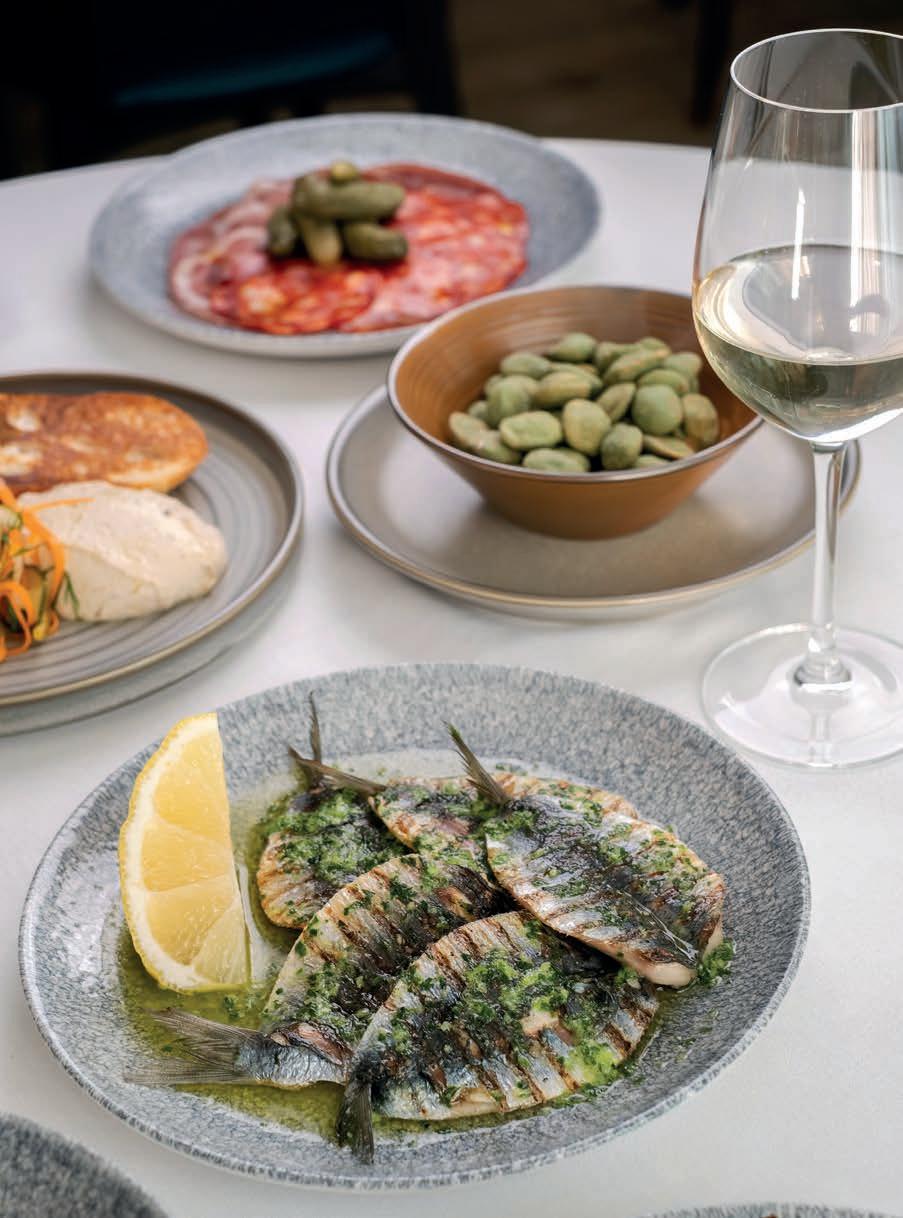

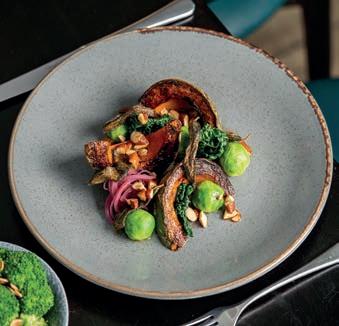
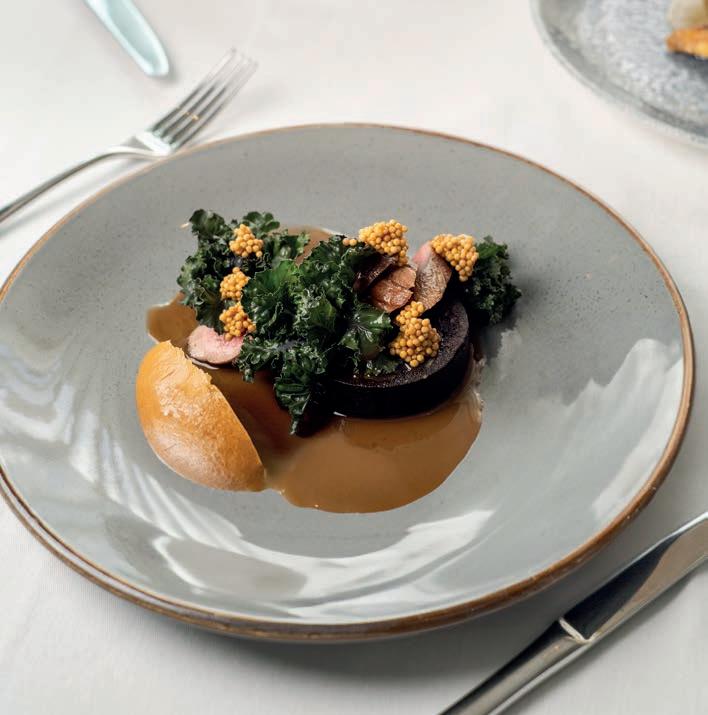
aren’t properly prepared.” He believes in readiness, in control, in the idea that a well-structured menu should not be an act of performance but something rooted, something practical. To this end the diners can see everything from the vantage point of the dining room – there are no barriers, no illusions.
The influences that shaped him remain embedded in his cooking. Rick Stein, the gateway to a love of food when he was young. Jamie Oliver, whose enthusiasm first made the act of cooking seem approachable. And Nathan Outlaw – working under him was a confirmation, a realisation that skill, humility and precision could be embodied in a single chef. “A genuine person and an incredible chef who managed to have an unassuming presence at the Fish Restaurant where I worked under him,” he says. The lesson Jake took from those early inspirations was not one of imitation but of principle: to respect the craft, to understand that the best cooking does not impose itself but enhances what is already there.
Food, for him, is both deeply personal and entirely communal. His partner, Petra, is Slovakian, and last year he recreated a cake her mother once made for him – though the original recipe remained a closely guarded secret, he worked with Cornish ingredients to echo its spirit. In a way, it is emblematic of his approach: an act of interpretation, of respect, of allowing the past to inform the present. There is always an awareness of
place in his food. Cornwall is not simply a location but a larder, a climate, a culture. Its land and sea dictate what is possible, but also what makes sense. “When it comes to sustainability, then Cornwall’s a unique place,” he says. “We have a lot of farm land that is not able to grow vegetables, so it makes sense to have small herds of cattle and pigs.” Sustainability, for him, is not a trend but a logical response to the landscape – an understanding of balance, of working with what is naturally available rather than forcing an ideal onto a place that does not support it.
At St Moritz, the cooking is guided by principle rather than excess. “What we do with the food here is always based on value for money,” he says, a statement that underlines his pragmatic approach. This is not about austerity but about fairness – about ensuring that what is offered is worth what is paid, that quality is not a privilege but an expectation.
After years in kitchens around the world, Jake Grove has found himself back where he started, but not in the same place. The boy who walked into the Port William Inn at seventeen has been shaped by fire, by discipline, by experience. And yet the core remains unchanged: the thrill of creation, the satisfaction of feeding others, the belief that a dish, done well, can tell a story all of its own.
stmoritzhotel.co.uk
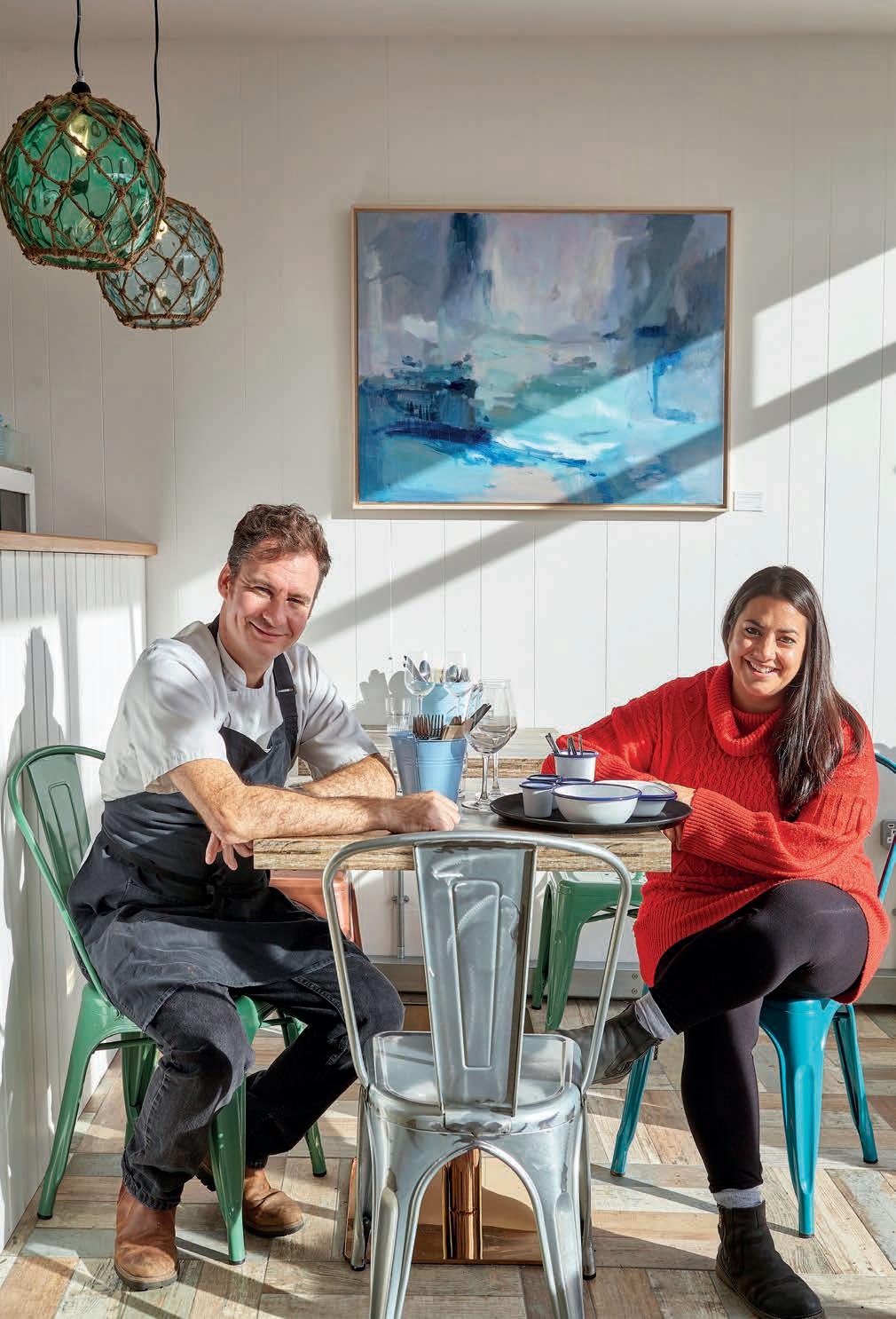
WORDS BY JAMIE CROCKER
From London lights to Cornish waters, a seafood venture captivates coastal appetites.
They arrived as strangers in 2012, a couple from London with hospitality dreams but no local connections. Today, Nina and Jamie run Mackerel Sky Seafood Bar, a destination that has transformed Newlyn’s culinary landscape with remarkable precision and care. Their journey exemplifies the quiet determination that characterises Cornwall’s independent food scene – a tale of metropolitan expertise meeting maritime tradition in perfect harmony.
The transition wasn’t without challenges. Nina, whose original career path pointed toward educational psychology before veering into hospitality management, recalls their early days with candid reflection. “Starting a business where you know absolutely nobody was difficult,” she admits. Those initial hurdles only multiplied when COVID-19 coincided with caring for their newborn, testing both their business acumen and personal resilience in ways they couldn’t have anticipated when they first glimpsed Cornwall’s rugged coastline.
Their decision to move southwest came after years of travelling and working in Australia and London’s competitive culinary landscape. The couple had honed their craft in various catering roles, eventually settling in Surrey where they managed a country pub. But Cornwall called to them – its
rhythms and produce offering something London’s frenetic energy couldn’t match. When they finally made the move in late 2012, they brought with them metropolitan standards without the accompanying pretension.
“We wanted to create something authentic but accessible,” Nina explains, describing their vision for a place where fresh seafood could be enjoyed without ceremony or intimidation. This philosophy shaped every decision, from menu design to interior aesthetics. The result is a space that feels simultaneously contemporary and real.
Yet where others might have retreated when faced with initial obstacles, they expanded with calculated confidence. The adjacent flower shop became their first acquisition, extending their footprint in a move that honoured the building’s character while amplifying their culinary vision. By 2022, they had launched their Seafood Shack, effectively doubling capacity and introducing a deli stocked with carefully selected local products and gifts.
This growth necessitated expanding their team from 20 full-time employees to between 35 and 40 during peak season –an impressive evolution for a business that began with just the two of them and their passion for fresh seafood. The employment
opportunities they’ve created ripple through Newlyn’s economy, providing yearround stability in a region often defined by seasonal fluctuations.
What distinguishes Mackerel Sky beyond its expansion is its genuine accessibility. “We’ve converted many people who insisted they didn’t eat fish,” Nina explains with understated pride. The menu strikes a delicate balance between innovation and approachability. Crab nachos – a dish that marries local catch with international flair – sit alongside traditional seafood-tasting plates, creating pathways for the curious but cautious to explore maritime flavours.
Their culinary approach transforms perceptions. Fish sceptics become enthusiasts after tasting how locally caught seafood, prepared with understanding and respect, bears little resemblance to distant memories of school cafeteria fish fingers. Each plate serves as both an introduction and argument – a case made through flavour rather than words.
This philosophy extends to their price point, deliberately calibrated to welcome everyone from casual diners to those seeking more refined experiences. The result is a customer base split evenly between locals and visitors, an uncommon equilibrium in Cornwall’s seasonal economy. Even in quieter winter months, local patronage continues, a testament to the genuine relationship the couple has built with their community.
The restaurant’s interior reflects the owners’ thoughtful approach – unpretentious yet considered, with the original building’s charm preserved rather than polished away. When the opportunity arose to relocate to larger premises, they declined, recognising that the character of their space contributed
significantly to the dining experience. “Some places you just can’t recreate,” Nina observes, acknowledging how the building’s history has become intertwined with their own story.
Their commitment to locality extends beyond architecture to ingredients. Morning conversations with fishermen determine the day’s offerings, ensuring what reaches the plate reflects the sea’s daily rhythms rather than commercial convenience. This relationship with suppliers creates a transparency that customers increasingly value – knowing not just what they’re eating but where it was caught and by whom.
For the couple, success transcends financial metrics. Watching formerly reluctant customers return specifically for dishes they once avoided delivers profound satisfaction. Their commitment extends beyond the plate to community sustainability, maintaining relationships with local fishermen and producers throughout Cornwall’s quieter months when tourist trade diminishes but local needs remain.
The deli represents their latest evolution – a space where customers can take a piece of the Mackerel Sky experience home. Filled with products that reflect Cornwall’s abundant larder, it serves as both a complement and extension to the dining experience.
In a region where food ventures often struggle to find footing, Mackerel Sky demonstrates how authentic vision paired with receptiveness to local culture creates something truly worthy of celebration. They’ve discovered that success lies in adaption to the local environment much like the patterns of mackerel clouds after which their establishment is named.
mackerelskycafe.co.uk
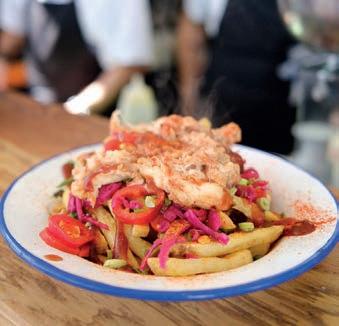

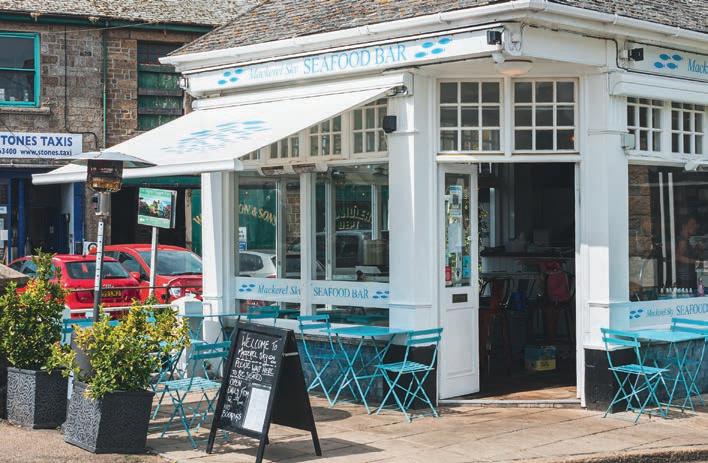
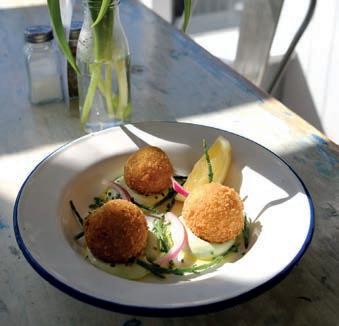
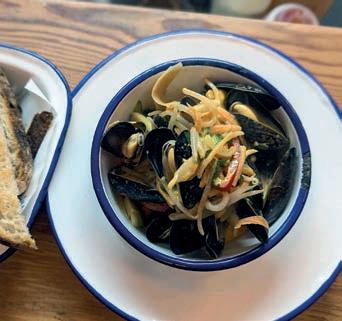
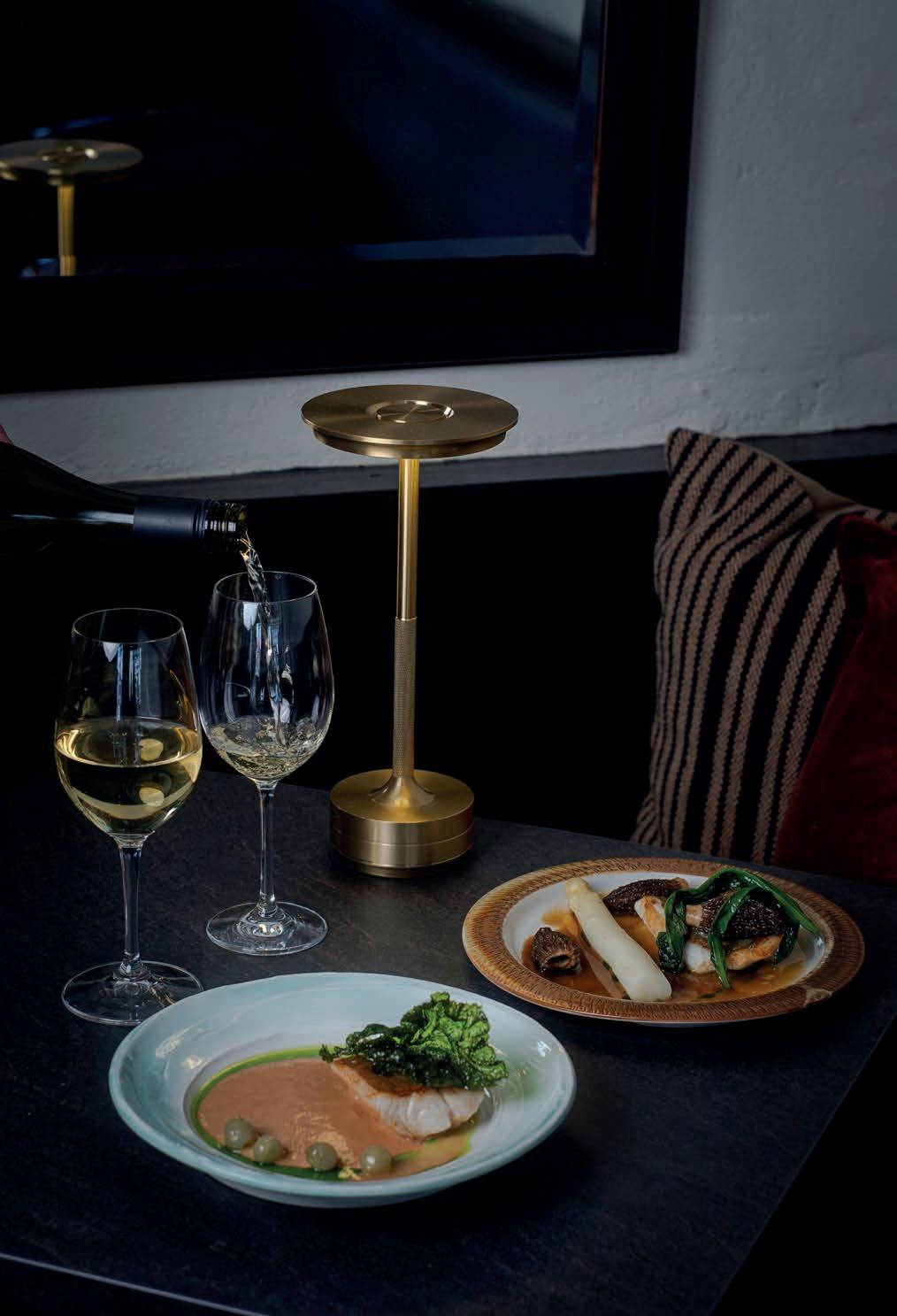
WORDS BY JAMIE CROCKER
ota and ota ai are spaces of uidit where a ours and ideas mer e, shi and suddenl e ol e with ease.
Celebrating 20 years of culinary excellence, Kota has long been a cornerstone of Porthleven’s burgeoning food scene. Alongside its sister establishment, the 14-year-old Kota Kai, they have been instrumental in transforming Porthleven into a recognised culinary destination. Their enduring presence has helped elevate this once-quiet fishing village into a gastronomic hotspot that attracts visitors from across the United Kingdom and beyond.
After years of operation, Kota Kai underwent a comprehensive rebrand and refurbishment that reflected the vision for its future. The addition of a wood-burning fire, a refreshed colour palette, a new bar and the removal of several walls have created an inviting, cosy space with distinct areas that elevate the dining experience.
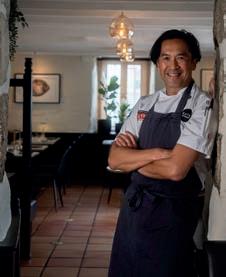
The lounge room has been reimagined as an intimate dining area, available for private hire for groups of up to 30 people. With closable doors offering additional privacy, it’s an ideal setting for more personal gatherings, celebratory occasions, and special events. The long dining room, with its stunning harbour views, remains available for larger parties of up to 70 guests. The former end room has been transformed into a snug area centred around the wood-burning stove, providing seating for up to 30 people. The new colour scheme has elevated the restaurant to a more sophisticated space while maintaining the influence of the
owner’s Asian-Maori heritage, creating a unique visual identity that sets Kota Kai apart from other establishments in the region. The culinary evolution of Kota Kai has been equally impressive, with the introduction of the Josper grill

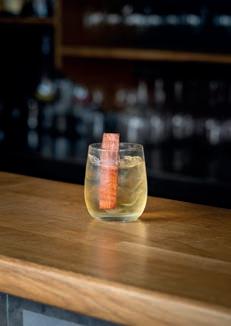
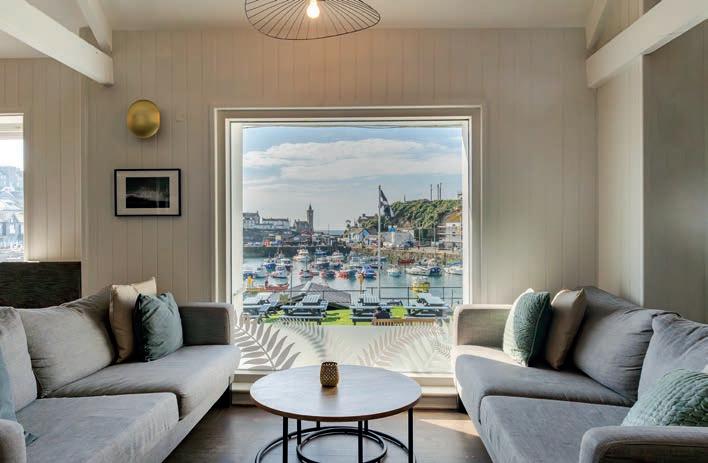

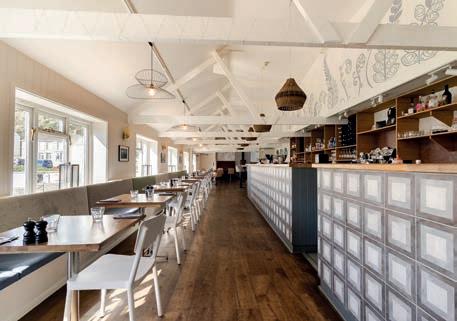
adding a distinctive smoky dimension to the menu. Beyond meat, the team grills fish, vegetables and virtually anything that benefits from this treatment, allowing them to create dishes with complex flavour profiles and a signature char that cannot be replicated with conventional cooking methods. A prime example is their Aji Rojo sauce, where tomatoes, red peppers, onions, garlic, and red chillies are blistered to absorb those characteristic BBQ flavours. The ingredients are then blended with smoked paprika, olive oil, coriander, sherry vinegar, and dried oregano to create a versatile sauce perfect for fish or vegetarian tacos. Even a simple grilled steak takes on new life when paired with their Asian green herb dressing, demonstrating how this specialised equipment has expanded the restaurant’s culinary capabilities and allowed the chefs to experiment with techniques that were previously beyond reach.
What distinguishes both Kota restaurants is the influence of the owner’s diverse background. His M ori heritage informs his passion for foraging and gathering – practices he grew up with, collecting mussels, clams, cockles, seaweeds, fish and crabs from the beach. This connection to the sea resonates deeply with their coastal location, fostering a genuine appreciation for sustainable sourcing and seasonal ingredients. Meanwhile, his Chinese-Malay ancestry manifests in subtle Asian twists throughout the menu, from the soy master stock in Kota’s pork cheek dish to the purely heritage-inspired Curry Laksa at Kota Kai. This cultural fusion creates a distinctive culinary identity that cannot be found elsewhere in Cornwall, offering diners a unique experience that transcends conventional British cuisine while still celebrating local ingredients.
This year marks Kota’s 20th anniversary. While the restaurant has evolved to remain relevant to contemporary dining preferences, it has maintained its signature Asian influences, creating a consistent thread that connects past and present iterations. Following February’s refurbishment, the team introduced a new menu format designed to accommodate changing dining habits and preferences. While the tasting menus remain for those seeking a comprehensive culinary journey, they’ve added snack and Pintxos options to complement the refreshed service style. The redesigned dining room with new furnishings feels more vibrant and facilitates greater interaction with guests –diners will often find the chefs personally delivering dishes to tables.
The upgraded bar area now accommodates an expanded wine selection, anticipating the launch of Kota’s wine shop in late spring. This new venture will allow customers to sample and purchase wines they might not otherwise encounter, focusing on small producers and sustainable viticulture practices. Later in the year, they’ll inaugurate the Kota Wine Club, hosting a series of winemaker and supplier dinners – an exciting new chapter for Kota that will further cement its reputation as a destination for oenophiles and food.
The aesthetic dimension of both establishments has been carefully considered, with artwork in both restaurants curated with intent. At Kota, they’ve collaborated with Maxine Greer, whose work adorns the walls and reflects the ingredients used in the kitchen. These pieces have become conversation starters and personalise the space, enhancing the dining experience through
the interplay of art and menu. Similarly, the artists featured at Kota Kai – Zee’s porthole-shaped works, Felix’s lounge pieces, and Mickey’s photography –collectively capture the restaurant’s essence.
Kota Kai has recently welcomed Ryan Venning as Head Chef, bringing fresh experience and energy to the kitchen. Ryan and Jude are collaborating to evolve the menus while maintaining Kota Kai’s signature Asian flavours, working together to guide Kai into its new iteration while respecting its established identity. Meanwhile, at Kota, long-time colleague Ross Sloan has adapted to the post-refurbishment changes, embracing the more accessible menu format of smaller plates and snacks alongside a frequently changing six-course chef’s menu.
Community engagement has been a cornerstone of both restaurants’ ethos. The Porthleven Food Festival, which began in 2009, was conceived by Jude and friends to draw national attention to the area. The concept – a food and music festival celebrating Cornish culture and produce – has exceeded all expectations in its longevity and reception, growing from a small local event into a nationally recognised celebration that draws visitors from across the country. During the festival, both restaurants host special events: Kota Kai offers feasts on Friday and Saturday nights with DJs throughout the weekend, while Kota focuses on champagne and sparkling wines paired with seafood and vegetarian dishes (with options for meat enthusiasts as well). They also operate a Budvar bar outside the restaurant, adjacent to their outdoor dining area. The team eagerly anticipates welcoming chef colleagues who will join
them and perform on the demonstration stage, sharing knowledge and techniques with festival attendees.
New Zealand and Cornwall share many culinary ingredients and approaches. The Cornish larder offers exceptional produce from both land and sea. The restaurants forage along the coast and in local woodlands, source from organic farms providing seasonal produce, work with local fishermen supplying the UK’s most diverse seafood selection, and partner with Warren’s Butchers.
The cocktail menu emerged from collaborative sessions with Chris Jarret and resident bar expert, Ash, focusing on flavours that would complement the food menu. The resulting cocktails have evolved significantly, with Ash continuing to develop exceptional new creations that are dangerously good. A complete bar refurbishment has enhanced their ability to produce these cocktails brilliantly and e ciently.
With Kota now in its 20th year and Kota Kai in its 14th, they’ve witnessed and contributed to Porthleven’s transformation. When Jude arrived in 2004, the town was relatively unknown to most visitors; 21 years later, it has become a recognised holiday and culinary destination, populated with establishments that collectively create a vibrant food scene. Following their recent refurbishments, the future looks bright for both as they continue their gastronomic journey in Porthleven, maintaining their position at the forefront of Cornwall’s dining.
kotarestaurant.co.uk
kotakai.co.uk
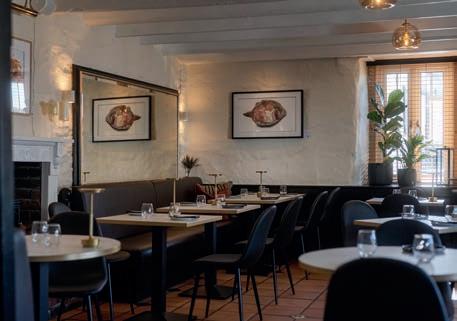
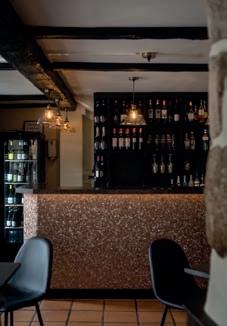
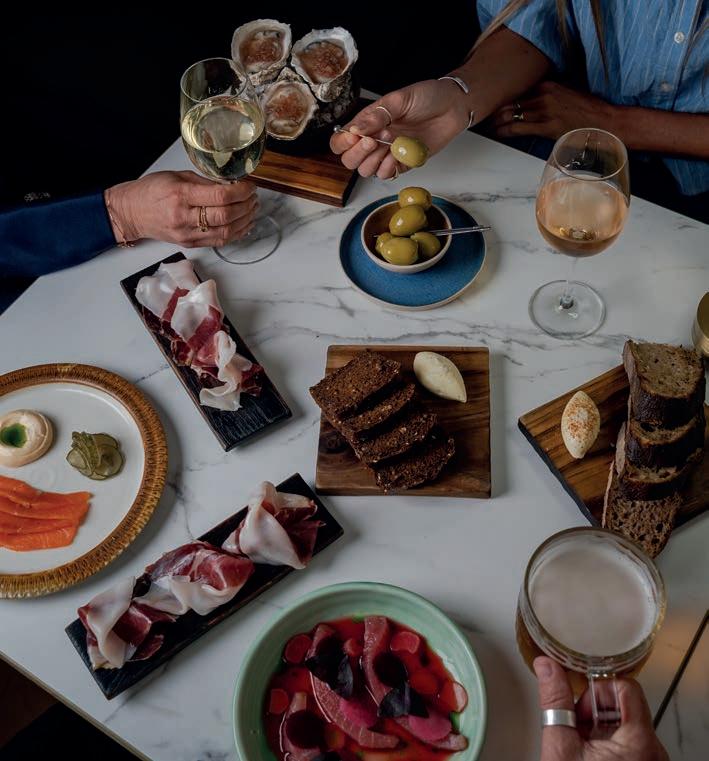
WORDS
BY JAMIE CROCKER
From professional rugby player to culinary maestro, Rupert Cooper elevates the Cornish dining experience.
On the Roseland Peninsula, a place that seems to sit apart from the frantic demands of the times we live in, you’ll find hilleigh Way Cookery School – one man’s love affair with uncomplicated, quality cuisine made manifest.
upert Cooper, a former professional rugby player turned chef and entrepreneur, has established a culinary haven that reflects his straightforward philosophy good food, fresh ingredients and fuss free dining.
The contemporary cookery school lies within a designated rea of utstanding Natural eauty, neighbouring stables, a church and an excellent village pub. ere, Rupert’s approach to food education is pragmatic and unpretentious. is calm demeanour in the kitchen comes naturally after honing his craft in some of the world’s top culinary establishments, yet what really sets him apart is his ability to infuse each lesson with warmth and wit.
“We teach, inspire and delight,” upert explains of hilleigh Way’s ethos, where full and half day cookery classes offer insight into traditional farmhouse recipes passed down through generations. These heritage
offerings stand alongside asque, Catalan and Mediterranean inspired dishes that showcase his versatile expertise.
Beyond individual classes, the school caters to corporate away days and team building functions, offering pre designed and bespoke experiences. The space can be transformed for feast events and supper clubs, creating memorable dining experiences that celebrate Cornwall’s abundant produce. rivate dining options, event catering and school workshops round out the comprehensive offerings.
upert’s culinary reach extends beyond hilleigh Way to include Cove Caf at ayle each. erched above the cliffs at iviere Towans, this laid back eatery presents fresh food from local producers against the backdrop of a spectacular coastal panorama. pen daily, the caf serves everything from morning coffees and pastries to hearty lunches, with special Sunday roasts and themed feast nights throughout the year.
Fire cooking techniques feature prominently in Rupert’s repertoire, particularly at the caf where Middle astern influences and
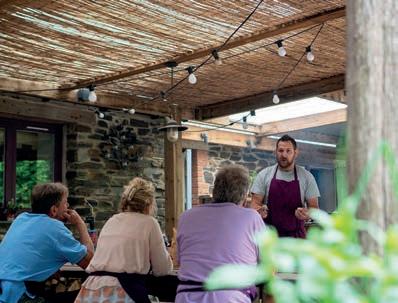
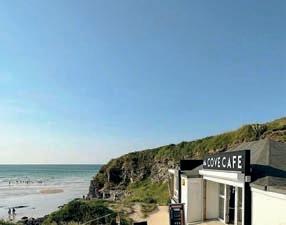


global flavours transform simple ingredients into extraordinary dishes. The space, available for private hire, hosts everything from intimate birthday celebrations to corporate Christmas gatherings.
Completing upert’s trinity of culinary ventures is orgia ull Catering, proudly described as the Cornish quarter.’ This arm of his business brings his distinctive fire cooked cuisine to pop up events across Cornwall, festivals, weddings and private dining experiences.
What unites these diverse enterprises is his genuine passion for food and people. is approach is refreshingly
unpretentious – creating exceptional dining experiences without unnecessary complexity. Whether teaching traditional Cornish recipes or experimenting with international flavours, his focus remains squarely on quality ingredients prepared with expertise and presented with characteristic good humour.
s new projects simmer on the hori on, teased through his social media channels, it’s clear that Cornwall’s culinary landscape continues to be enriched by upert’s distinctive blend of professional excellence and approachable charm.
philleighway.co.uk
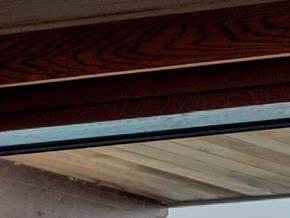




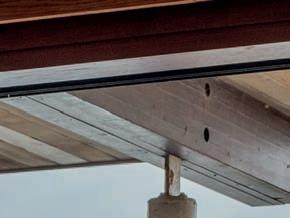

WORDS BY JAMIE CROCKER

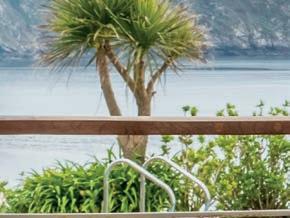



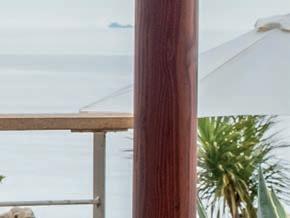
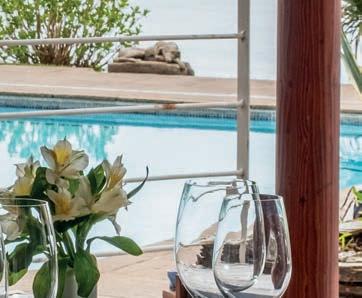

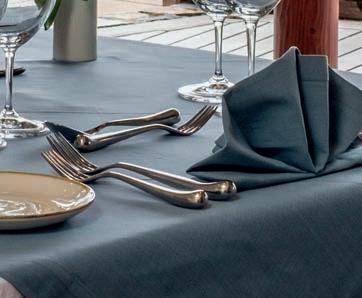


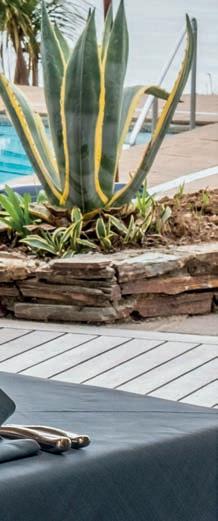

Tne of Cornwall’s nest coastal otels elevates seafood dining to new eig ts.
he Nare Hotel embodies the term ‘understated luxury.’ Situated on the Cornish coastline, this family-owned establishment has perfected the art of sophisticated hospitality via decades of careful cultivation. Positioned with commanding views over Gerrans Bay, this five-star independent retreat offers discerning visitors a glimpse into a world where traditional values of service excellence merge effortlessly with contemporary comforts.
As the sole five-star country house hotel in Cornwall, The Nare has carved an enviable reputation for itself since the Ashworth family acquired it in 1989. Under their stewardship, the property has evolved into a place of refinement that attracts guests seeking authenticity rather than fleeting trends. The hotel presents itself not as a fashionable hotspot but as a destination where the emphasis falls squarely on genuine care and attention to detail.
The approach to The Nare hints at what awaits – a winding coastal road reveals the elegant cream-coloured building sitting in splendid isolation above Carne Beach. The architecture, neither ostentatious nor retiring, complements rather than competes with its natural surroundings. Inside, the décor speaks of considered
organic inspiration rather than excessive opulence pandering to the latest trend; comfortable sofas invite relaxation, fresh flowers appear in thoughtful arrangements and walls showcase carefully selected artwork that reflects the region’s rich cultural heritage.
Accommodation at The Nare gently introduces the notion of place while ensuring guilt-free comfort. Many rooms feature private balconies or terraces from which guests can absorb views that shift and change with Cornwall’s mercurial weather patterns. The beds, draped in fine linens, promise deep, restorative sleep accompanied by the distant lullaby of waves breaking on the shore.
The gardens descend in terraces toward the sea, offering secluded corners for contemplation or conversation. An outdoor swimming pool provides refreshment during summer months, while an indoor pool ensures year-round swimming regardless of Cornwall’s capricious climate. For those seeking deeper relaxation, the hotel’s spa facilities offer treatments using locally-sourced products that harness the region’s natural bounty.
The Nare’s commitment to genuine hospitality manifests in countless







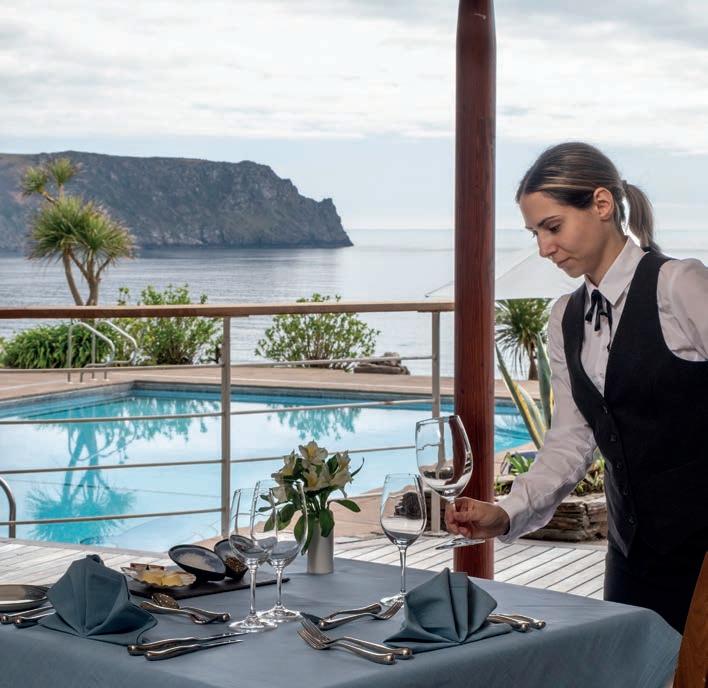
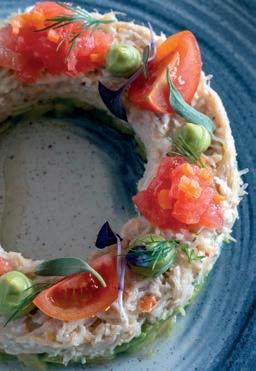
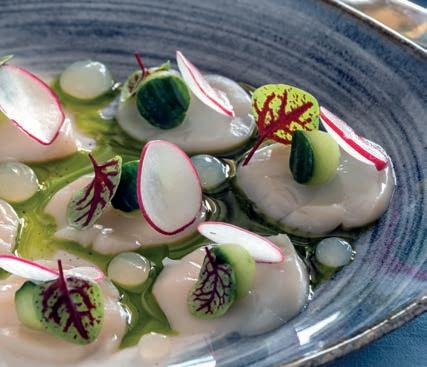
thoughtful touches – from the availability of classic wooden boats for exploring the Fal estuary to the provision of wellington boots for coastal walks, from afternoon tea served with precision to digestifs offered in the comfortable lounge as evening descends. The staff move with quiet e ciency, anticipating needs rather than responding to demands.
This dedication to excellence extends most notably to the hotel’s culinary offerings. The Nare has long understood that exceptional dining forms the cornerstone of memorable hospitality. The main dining room, with its formal yet welcoming atmosphere, offers traditional fare executed with finesse. Here, head chef, Andre ima crafts dishes that celebrate Cornwall’s agricultural abundance while honouring classical techniques.
Yet it is The Quarterdeck Seafood Restaurant that has recently undergone a transformation so significant it merits special attention. Reimagined as a premier seafood destination, this restaurant has evolved from an already respected establishment into something approaching culinary theatre, where Cornwall’s maritime bounty takes centre stage against a backdrop of extraordinary natural beauty.
The Quarterdeck’s positioning along the gentle curve of Gerrans Bay provides diners with panoramic vistas of turquoise waters meeting the sands of Carne Beach. Thoughtfully designed interiors complement these views without distracting from them; the colour palette draws inspiration from the surrounding seascape, with subtle blues and greens creating a sophisticated yet relaxed atmosphere. In summer months, the outdoor deck
becomes perhaps the most coveted dining location in Cornwall – a place where guests can savour both exquisite cuisine and uninterrupted views while basking in the sunshine. During winter, large panoramic windows ensure that stormy seas become dramatic entertainment, allowing diners to experience Cornwall’s raw beauty while remaining in perfect comfort.
The recent reimagining of The Quarterdeck has elevated its focus explicitly toward seafood excellence. This specialisation reflects both geographical logic and culinary passion – Cornwall’s waters yield some of Britain’s finest fish and shellfish, while the restaurant’s team demonstrates remarkable skill in showcasing these ingredients.
Every element of The Quarterdeck experience has been meticulously considered during its transformation. The crockery, specially selected to mirror the shimmering qualities of the sea, provides an appropriate repository for visually striking presentations. Even the linens have been colour-matched to complement the overall aesthetic, reflecting an attention to detail that extends far beyond mere functionality.
The menu reads like a celebration of Cornwall’s marine environment. St Mawes octopus appears, treated with respect and technical prowess. Hand-dived scallop ceviche offers delicate flavours enhanced, rather than overwhelmed, by thoughtful accompaniments. Cornish Bluefin tuna raviolo demonstrates technical ambition matched with flavour intelligence. Monkfish Wellington reinterprets a classic with remarkable success, while whole Dover sole receives the simple treatment such magnificent fish deserves.
Local lobster, grilled with precision, reminds diners why this crustacean maintains its luxurious reputation. For those seeking the ultimate expression of Cornwall’s maritime bounty, the fruits de mer platter arrives as a showstopper – an architectural arrangement of oysters, crab, prawns, mussels and other delicacies that encapsulates the restaurant’s philosophy on a single spectacular tier.
The dessert menu reveals equal creativity and execution, with the Earl Grey crème brûlée emerging as a signature – a classic French technique infused with distinctly British sensibility, resulting in a dish that satisfies both traditionalists and those seeking novelty.
Beneath the surface glamour of The Quarterdeck’s dining experience lies a foundation of genuine environmental consciousness. The restaurant incorporates hand-foraged ingredients including seaweed, wild garlic and elderflower, reflecting both culinary creativity and environmental responsibility. By partnering with Wings of St Mawes – a multi-awardwinning fishmonger recognised as Britain’s finest – The uarterdeck ensures that its seafood is not only exceptional in quality but also responsibly sourced.
Perhaps most impressively, The Quarterdeck has established a partnership with the National Lobster Hatchery, contributing to their “Buy One, Set One Free” initiative. For each lobster purchased, the restaurant donates £1 toward raising and releasing baby lobsters back into local waters. This commitment to sustainability ensures that future generations will enjoy
the same delicacies that current diners savour, creating a cycle of consumption and conservation.
The service at The Quarterdeck matches its culinary ambitions – knowledgeable without pretension, attentive without intrusion. Staff members demonstrate genuine enthusiasm for the food they serve, often sharing insights about ingredients’ provenance or preparation methods without resorting to rehearsed speeches.
What emerges from The Nare’s recent evolution of The Quarterdeck is something approaching restaurant alchemy – a dining destination that combines extraordinary location, exceptional ingredients, technical skill and genuine environmental consciousness. While Cornwall has witnessed numerous restaurants rise on waves of publicity only to disappear as fashions change, The Quarterdeck seems positioned for enduring significance through its commitment to substantive excellence rather than ephemeral trends.
For visitors to Cornwall seeking more than picturesque views and predictable menus, The Quarterdeck represents a compelling destination – a place where the region’s natural abundance receives the culinary treatment it deserves. Within the already exceptional context of The Nare Hotel, this restaurant’s transformation emerges as a defining statement of intent: to create dining experiences that remain in memory long after the final course has been savoured and the final view of Gerrans Bay has faded into the distance.
nare otel.co.uk
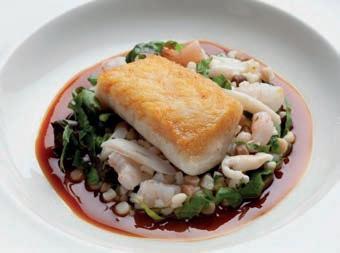

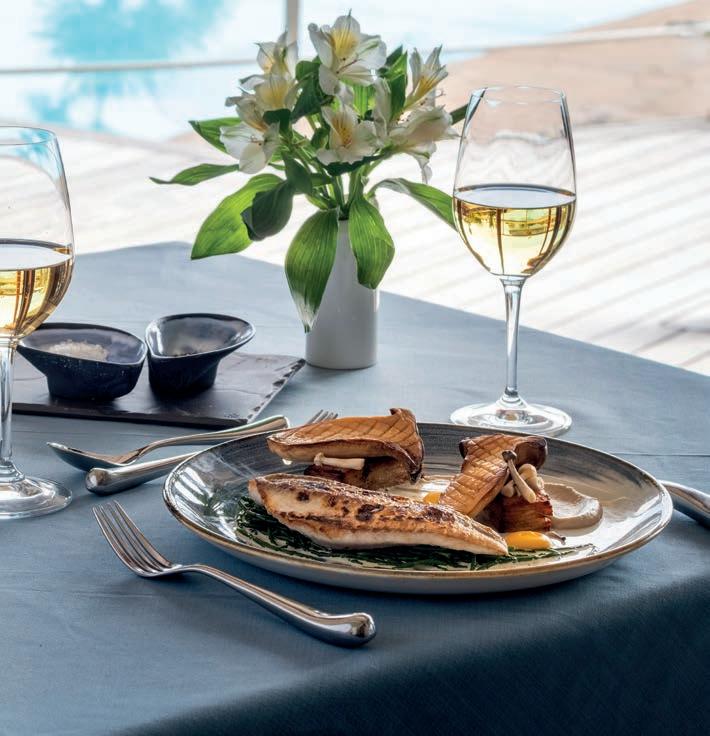
ABOVE
Sophisticated waterfront offerings await discerning diners
WORDS BY JAMIE CROCKER
From an impulsive solution to a county-wide phenomenon, Tom’s baking legacy turns twenty.
Within the folds of Cornwall’s landscape, like the dough that is kneaded into shape, a simple act of necessity twenty years ago sparked what would become a culinary institution. When a young Tom returned from India’s dusty highways to the windswept peninsula of his homeland, fate conspired with flour and yeast to forge a new path. Working at a local farm shop, confronted with empty shelves meant for bread, Tom turned crisis to opportunity with characteristically Cornish resourcefulness.
The loaves he baked that day, which had been mixed in his kitchen, kneaded by inexperienced but determined hands had vanished from the shop by closing time. More followed the next day, disappearing just as quickly. In that moment of humble commerce, Baker Tom’s drew its first floury breath.
Cornwall flows through the mix of this enterprise like the inlets that cut through its coastal edges. Tom’s formative experiences of riding horses across moorlands and crafting vessels in quiet harbours have imbued his baking philosophy with an appreciation for both skill and context. His bread speaks of the landscape: substantial, honest, unadorned yet deeply satisfying.
Two decades on, four distinctive shops dot the Cornish map from Penzance to Wadebridge, each a cornerstone in their community. The bakery’s new packaging, unveiled for this anniversary year, captures the kaleidoscopic facades of Falmouth’s harbour buildings – a town that holds particular significance in Tom’s personal geography.
The scale has transformed dramatically. Weekly production now consumes tonnes of flour, supplying countless establishments across the southwest. Yet the fundamental approach remains steadfast: wholesome ingredients, patient processes and bread that is allowed to develop character via time’s arrow rather than chemical shortcuts.
Long before environmental consciousness became commercially expedient, Baker Tom’s committed to regenerative flour and locally sourced ingredients. This foresight has positioned the bakery as a genuine pioneer in sustainable food production.
The business has demonstrated remarkable adaptability through changing times. During pandemic lockdowns, a mobile bread van wound through Cornwall’s narrow lanes, delivering sustenance and normality to isolated communities.



More recently, relocation to larger premises has expanded capacity while reducing environmental impact. Innovation continues with Baker Tom’s frozen bread range – allowing chefs across the region to serve fresh-tasting artisanal products with practical consistency. This thoughtful solution maintains quality while acknowledging the realities of modern food service.
Throughout Cornwall’s evolving culinary landscape, Baker Tom’s products – from the simplest white loaf to intricately crafted
sourdoughs – have become fundamental elements on menus both modest and celebrated. The bakery has grown alongside Cornwall’s gastronomic reputation, each enhancing the other through two decades of mutual development.
As Baker Tom’s marks twenty years, the enterprise remains rooted in its founding principle: creating authentic bread with integrity, born from and belonging to the extraordinary landscape of Cornwall.
bakertom.co.uk







WORDS BY HANNAH TAPPING







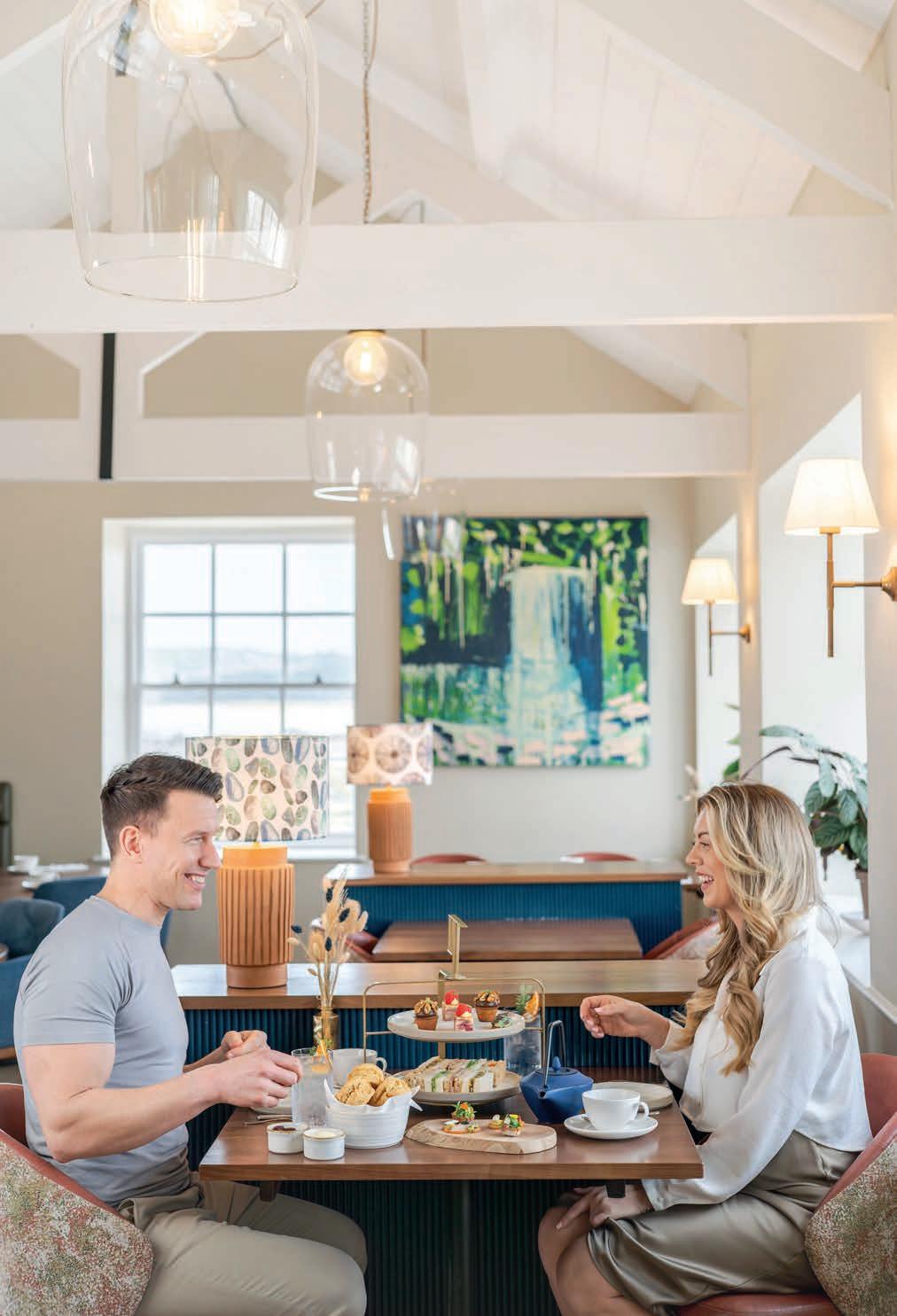
e reinvention of an afternoon classic on t ic ael’s ount is receiving muc acclaim.
Standing sentinel in Mount’s Bay, all eyes are drawn to an iconic castle and medieval church sat atop a rocky island, joined only to the mainland by a cobbled causeway. It marks the final step in St Michael’s Way, Cornwall’s section of the Santiago de Compostela Pilgrim Way and is steeped in history and Cornish legend. The modern St Michael’s Mount remains the home of the St Aubyn family and has a thriving harbourside village island community. This ancient tidal island attracts visitors from near and far, who make their way along the cobbled causeway at low water, or by ferry boat when the tide is high. While the Mount’s ancient architecture, subtropical gardens and art collections have long been a draw to visitors, it has a new allure and this time, it’s a reimagining of a culinary classic.
of the place, that seasoned food writer Martin Hesp recently mooted it to be “the best afternoon tea in the region, if not the country!”
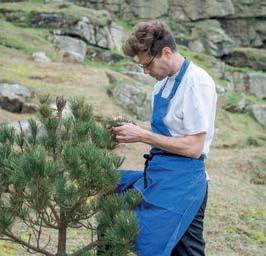
Taking inspiration from the island itself, combined with a tradition said to have been invented by the seventh Duchess of Bedford, Anna Maria Russell sometime around 1840, the Mount’s restaurant, The Harbour oft, serves an afternoon tea that is so unique, so bursting with the flavour
Afternoon tea at The Harbour oft is a love letter to the island’s natural larder and the brainchild of Head Chef Greg Milne, whose culinary story is anything but conventional. A former lead singer in a heavy metal band and National Trust warden, Greg now channels his creativity into crafting one of the most innovative afternoon teas on the scene. With a passion for foraging wild ingredients, seafood, French cuisine and patisserie, Greg brings new sensory dimensions to this fine tradition; the tiered plates are a feast for the eyes, the freshly baked scones smell more than divine and each bite delivers a taste sensation. When we were first conceptualising the afternoon tea offering, I knew it had to resonate with St Michael’s Mount and truly embody the essence of the island,” explains Greg, I began by mapping all the edible flora I could find on the island, using that as a compass to guide the creative process –working backwards from the flavours of St Michael’s Mount.
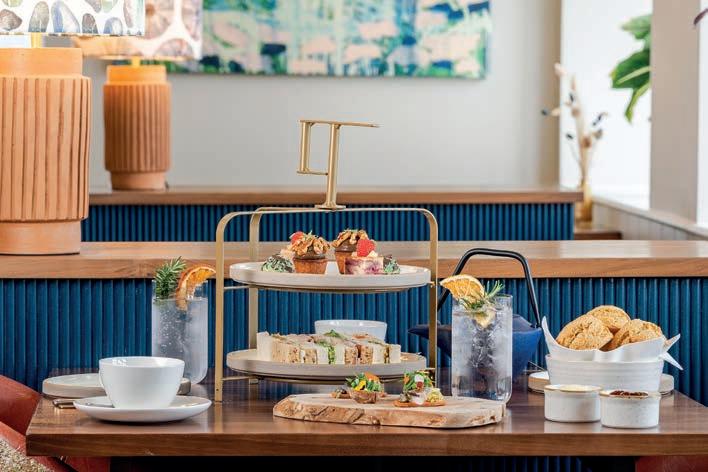
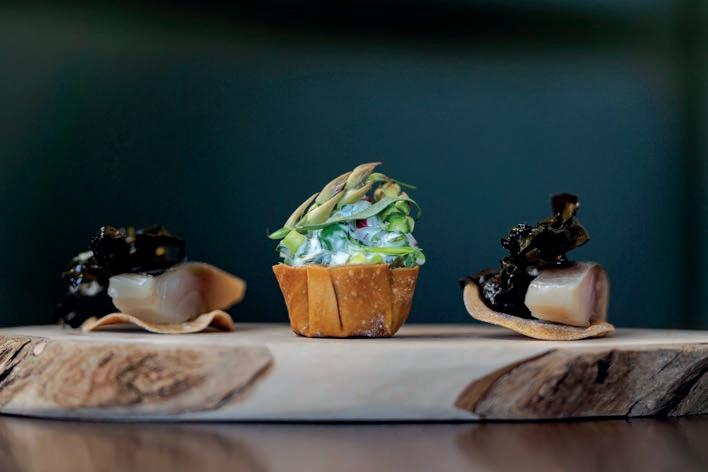
Served from April to October, here, you’ll find melt-in-the-mouth tartlets filled with smoked Cornish mackerel, beetroot and chervil tartlet, or a delicate combination of whipped ricotta and nettle choux. Crustless sandwiches take a wild turn – think hogs pudding, rosemary and cranberry; goat’s cheese, mushroom and thyme; Cornhill egg and devilled spices. “The menu almost always begins with what we’re able to forage in that season – it starts with the flavours of the landscape. From there, it becomes a creative process of weaving those ingredients through the menu in ways that are both interesting and delicious,” adds Greg.
And then there are the sweet treats. Pine and rose mousse cakes, and walnut, malted chocolate and nutmeg financier are a precursor to a sour blackberry and cinnamon chiffon. The scents are akin to the work of the finest perfumier, the confections are miniature works of art in themselves. Every element on the plate nods to the seasons, the setting and Greg’s devotion to flavour and originality: We wanted to give people a real taste of the island,” Greg explains. “Not just the food, but the feeling – that connection
to nature, to the seasons. You can taste the salt in the mackerel, smell the pine in the mousse. It’s all right here.”
The flavours of St Michael’s Mount evolve as the seasons unfold, which is why we adapt the menu accordingly. Some elements remain constant – for example, the Japanese white pine we use for the pine and rose mousse cake. In spring, it has a fresh, citrusy brightness, while by autumn it develops a deeper, more resinous intensity. These natural variances only enhance the seasonal nature of the menu.”
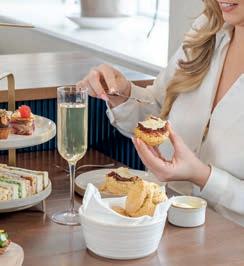
Of course, house-baked scones are unashamedly served with lashings of Trewithen Dairy clotted cream and Cornish strawberry jam, accompanied by a pot of Tregothnan tea. Such is the occasion, one might be tempted to raise a glass of local sparkling wine in honour of such a plateful of delights.
The list of local ingredients is intentional, as Greg explains: Sourcing locally is absolutely paramount. It ensures minimal environmental impact, reduces food miles, supports the local economy, and allows us to tell meaningful stories through the food

we serve. Where Greg can source from Cornish shores or fields he will and there’s endless opportunity to delve into the Mount’s own larder of beet, borage, buck’s horn plantain, Japanese white pine, rock samphire, rosa rugosa, saltbush vetch, sea sorrel and wild leek. When conceiving the menu for afternoon tea, I’m obsessed with layering flavours found on the Mount, both savoury and sweet, limiting myself (not exclusively) to foraged elements you can find on the island.”
The Harbour oft afternoon tea has become something of a foodie pilgrimage. Word of mouth, glowing write-ups and a social media buzz — not least from the many visitors who can’t resist Instagramming their tiered trays of forest-green mousse cakes and dainty tartlets – have helped secure its status as one of the ’s most exciting afternoon tea experiences. At . per person (with vegan, vegetarian and gluten-free options available) this is a luxury experience that’s surprisingly accessible. There’s also a special
children’s afternoon tea, at . , that includes sandwiches, cakes and a drink, plus a giant’s heart jelly!
The menu evolves with the months. Spring brings nettles and three-cornered leeks, summer highlights vibrant berries and floral notes, while autumn introduces deeper, richer tones. This is a rare kind of immersion. You’re not just dining – you’re engaging with a culinary narrative that reflects the rhythms of tide and time, of local community and wild harvest. A sense of place is arguably the most important aspect of the afternoon tea experience at the Harbour oft. Our unique offering is rooted in a strong connection to time and place. Every element is designed to reflect the bounty and beauty of St Michael’s Mount, Mount’s Bay, and Cornwall –evolving with the seasons,” concludes Greg. It’s a menu that breathes with the island –never static, always alive.
stmic aelsmount.co.uk


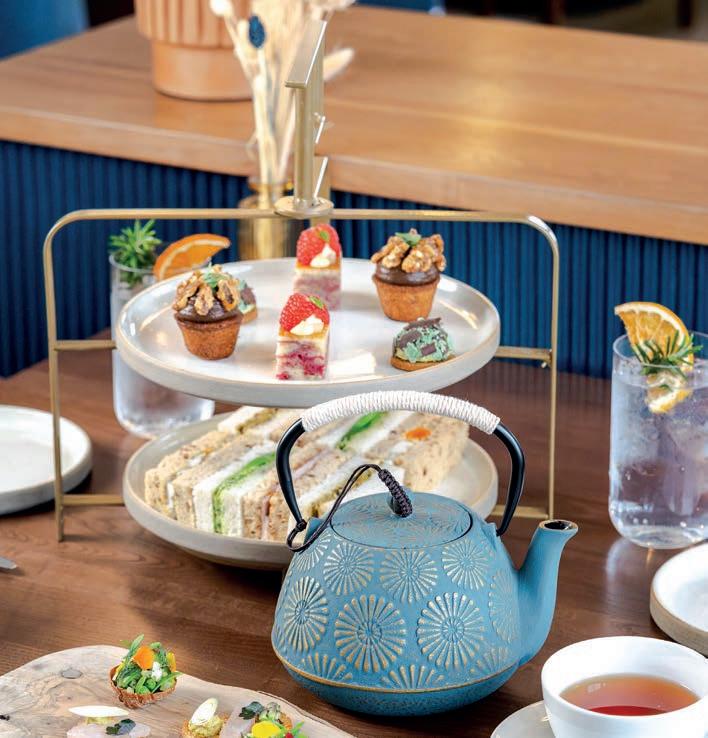
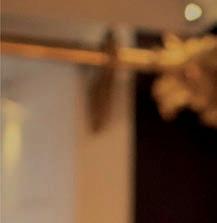









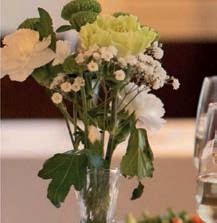
WORDS BY JAMIE CROCKER

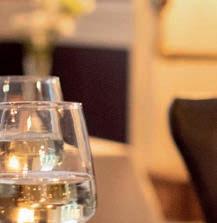







Georgian charm meets modern comfort and ne dining at t is distinguis ed Cornish hotel.
In a world of frenetic consumption and competition, there are still places of calm that seek to address our need to step off the treadmill sometimes, take stock and enjoy life’s pleasures for their own sake. The Penventon Hotel is one such place. Here we find out how this august establishment manages to achieve this.
Could you share the history of Penventon Park Hotel and how it has evolved over the years?
Penventon Park Hotel has a rich history. Originally conceived as Parkanhal’ by ohn Penberthy Magor in the late 18th century, it was inspired by his European travels. He infused the estate with continental elegance and Regency grandeur. Over the centuries,
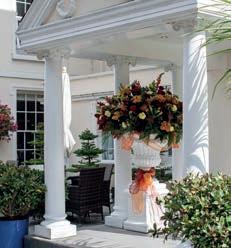
the property has been transformed under various custodians, each adding their chapter to its storied past. Notably, in 1969, David and Paola Pascoe acquired the estate, converting it into the luxurious hotel it is today. David’s passion for art and Paola’s (Mrs P) flair for hospitality have left an indelible mark on the hotel’s character. The hotel remains in the hands of the Pascoe family.
How does the hotel’s architecture and interior design reflect the cultural heritage of Cornwall?
Penventon Park Hotel embraces a sophisticated yet eclectic design philosophy, drawing inspiration from across the globe while maintaining a connection to its Cornish roots. This balance is reflected in carefully curated
elements like the standout Copper Bar, which pays homage to Redruth’s rich mining heritage. Crafted by Michael Johnston and his team at The Copper Works Newlyn, the bar showcases exceptional craftsmanship, with sculpted copper panels that create a striking ripple effect, the artisanal detailing enhancing the hotel’s contemporary elegance.
What is the guiding philosophy behind your restaurant’s menu, and how do you ensure it resonates with both locals and visitors?
At the Dining Galleries Restaurant, the guiding philosophy is “fun dine, not fine dine, ensuring an approachable yet high-quality experience. The restaurant focuses on bold flavours, seasonal ingredients and a relaxed but indulgent atmosphere, all crafted to provide a memorable dining experience without the formality of traditional fine dining.
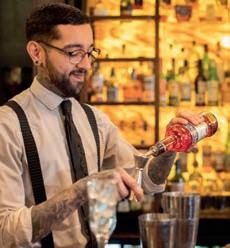
dishes inspired by global flavours, we take pride in highlighting Cornish produce. For instance, our breakfast service includes honey from Bees Off, a local organisation dedicated to rescuing and rehoming honey bees within the Cornish countryside, resulting in sustainably sourced honey. Additionally, Mrs P’s homemade jams, crafted from Cornish fruits, add a personal touch to our cream teas and breakfast spreads. By integrating these local specialities, we aim to provide guests with an authentic taste of Cornwall while supporting the community’s producers and artisans. Honourable mentions include Rodda’s, Baker Tom’s Bread, Cornish Tea Coffee Co., St. Ives Gin, Tarquin’s Gin, and the Cornish Cheese Co., all of whom contribute to the quality and character of our food and drink offerings.
How does the hotel incorporate locally sourced Cornish ingredients into its dishes, and could you provide examples of standout local suppliers?
The hotel celebrates Cornwall’s culinary heritage by thoughtfully incorporating local ingredients into its offerings. While our menu features a diverse range of
Are there particular dishes that have become synonymous with Penventon Park Hotel and what inspired their creation?
Penventon Park Hotel has long been known for its standout dishes, each with a unique story and deep-rooted heritage. Our Gambas Pil Pil is a treasured family recipe, inspired by the Pascoe family’s visits to Andalusia, Spain, where they fell in love with this Spanish classic. The secret
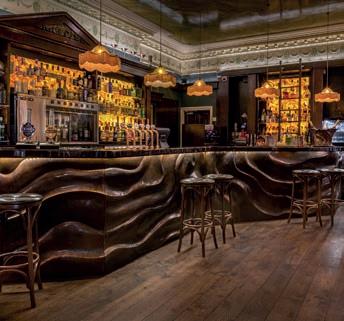
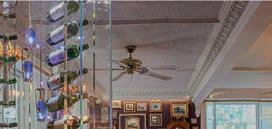




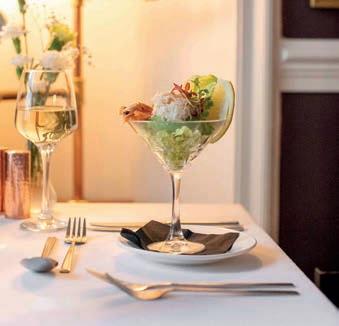
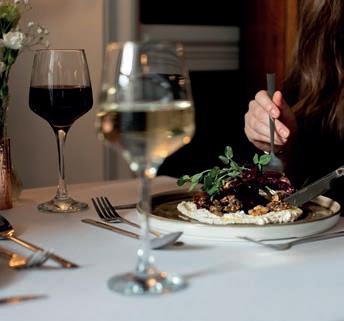

spice blend, known only to Aaron and Paola Pascoe, ensures the dish remains as authentic as the one enjoyed at Eugenio’s’ in Spain.
Another signature is Mrs P’s Tiramisu, a cherished recipe brought from Venice when the Paola moved to Cornwall. This indulgent dessert has remained unchanged since Penventon’s opening in , offering a true taste of tradition.
Finally, our Plank Steak is a nod to the hotel’s early menus, featuring a oz steak, fried hen’s egg, and pont neuf, all served on the signature wooden plank – a dish as bold and memorable as Penventon itself.
How does your menu change with the seasons and what can guests expect during different times of the year?
Could you elaborate on your wine list, particularly any emphasis on Cornish vineyards or unique selections that complement your menu?
We’re really big on our wines At Penventon Park Hotel, our passion for wine is reflected in our meticulously curated list of over selections from renowned regions across the globe. We are committed to offering exceptional value, applying a fixed markup on premium wines to encourage our guests to explore and enjoy a variety of vintages. To ensure each bottle reaches its optimal maturity, we lay down wines three years in advance, allowing us to present beautifully aged selections that harmonise with our culinary offerings.
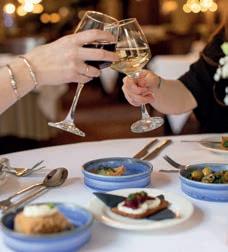
The menu changes with the seasons to reflect the best available produce. During the winter months, the focus shifts to heartier dishes, warm flavours and indulgent comfort food. Offerings like mulled wine, rich stews and seasonal desserts enhance the winter dining experience. Meanwhile, summer highlights lighter fare and fresh seafood accompanied by refreshing cocktails.
While our collection predominantly features international wines, we also celebrate local Cornish vineyards. Notably, we offer wines from Polgoon Vineyard, such as their Bacchus and Seyval Blanc, which showcase the unique terroir of Cornwall and provide guests with a taste of the region’s viticultural prowess.
Our forthcoming Wine Tasting Room is designed to enhance the guest experience further, providing an elegant setting for professional wine flights and tastings. This initiative underscores our dedication
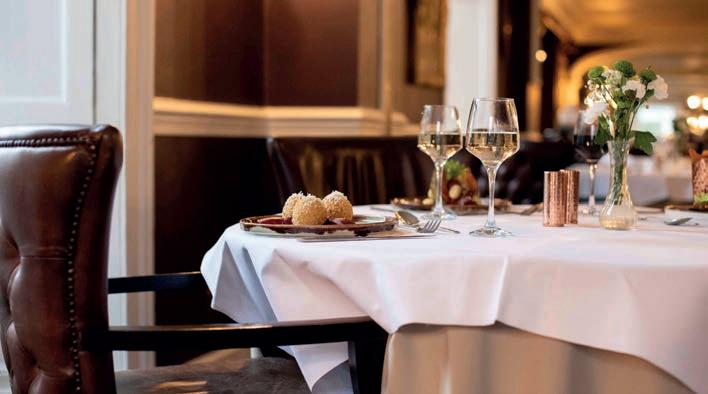
to not only offering exceptional wines but also educating and engaging our guests in the rich stories behind each bottle.
How would you describe the dining experience at your establishment and what atmosphere do you strive to create for your guests?
The dining experience at Penventon Park Hotel is designed to be warm, inviting and interesting. Whether guests are enjoying a leisurely breakfast, an intimate dinner, or celebratory drinks, the atmosphere balances relaxed sophistication with a sense of occasion.
Our restaurant, The Dining Galleries, takes its name from the carefully curated artwork that adorns its walls, creating a space where guests can appreciate both culinary and visual artistry. This setting reflects our dedication to creating a dining experience that is as much about ambience as it is about exceptional food.
Soft lighting, plush furnishings and attentive yet unintrusive service create an environment where guests can unwind and
Your
savour every moment. The atmosphere evolves throughout the day, from the gentle hum of morning gatherings to the intimate glow of candlelit dinners. Whether indulging in a signature dish or exploring a new favourite from our menu, dining at Penventon is an experience crafted to delight the senses.
What sustainable practices does your culinary team implement to minimize environmental impact while maintaining quality?
We respect the importance of sustainability by sourcing local and seasonal ingredients where possible, reducing food miles while supporting Cornish suppliers. Our culinary team follows responsible kitchen practices to minimise waste. We also ensure our seafood is ethically sourced, aligning with sustainable fishing guidelines. Beyond the kitchen, eco-friendly initiatives such as reducing single-use plastics and energy-e cient operations reflect our commitment to a more sustainable dining experience.
penventon.co.uk
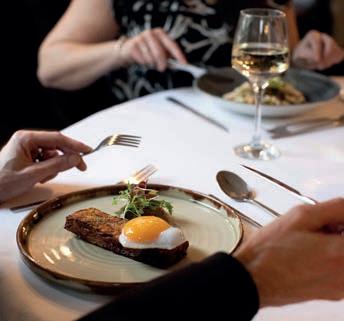

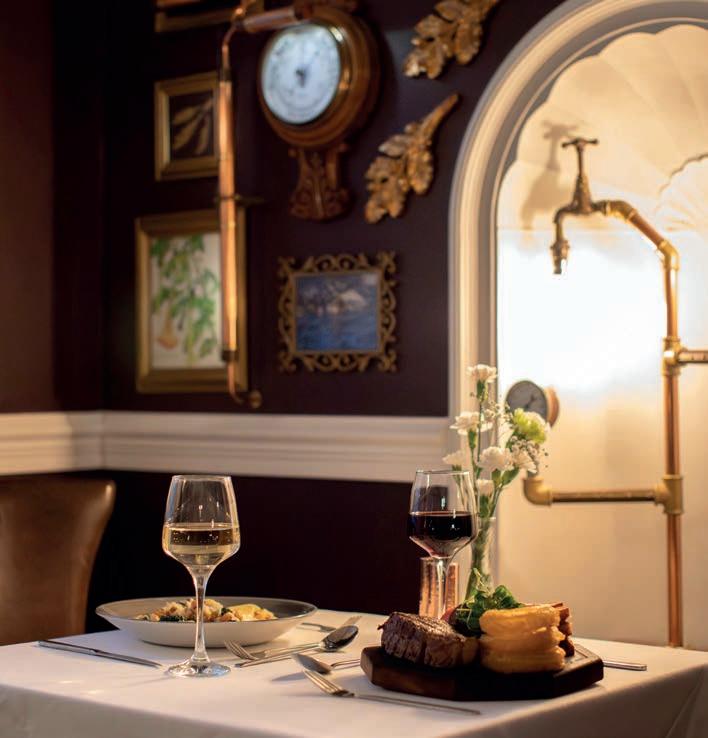
WORDS BY HANNAH TAPPING
Set in 65 acres of glorious gardens and wood ands, e udoc ean o ers a p ace of rest, re a ation and repast.
Approached along a quiet wooded Cornish lane you’ll find the understated splendour of The Budock Vean Hotel; its setting unique, with lush grounds that lead down to the Helford River. However, it’s not just location and exceptional spa facilities that draws discerning guests, the hotel is also renowned for its exceptional food and drink offerings. roviding a variety of dining experiences, the hotel blends fine dining with relaxed, casual options that showcase the best of local, seasonal ingredients. Whether you’re staying at the hotel or visiting, the menus are thoughtfully curated to reflect the flavours of the season.
For those seeking a light lunch, food is served in the bar, conservatory, and lounges with the all day terrace menu serving from midday to 9pm. The menu offers a variety of dishes, including seafood, salads and traditional favourites, with daily specials inspired by local produce. Hotel guests, and visitors exploring the Helford River area, can relax knowing they will receive a warm welcome to this culinary retreat.
A quintessential Cornish experience, afternoon tea at udock ean is a highlight. Available between 1pm and 4pm, guests
can indulge in scones, clotted cream, jam, cakes, and sandwiches. The full afternoon tea option is perfect for those looking to unwind after a day of sightseeing or walking along the coastal paths. Such is its popularity, booking in advance is recommended.
Dinner at Budock Vean is an elegant affair, served in the main restaurant, with a menu that features fresh, locally sourced ingredients. Non-residents are welcome, and it has become a dining destination for the Falmouth area. For a more casual option, the all day terrace menu offers dishes that can be enjoyed either indoors or outside on warmer evenings.
The hotel’s bars and lounges provide a sophisticated, yet cosy place for drinks, light lunches and dinner. With a well-stocked bar featuring local Cornish beers, spirits, and an extensive wine list, guests can enjoy a relaxing evening by the fire or sip drinks on the terrace overlooking the beautiful gardens and golf course. Whether visiting for a special occasion or simply enjoying the local flavours, the udock ean otel offers a culinary experience in one of Cornwall’s most picturesque locations.
budockvean.co.uk

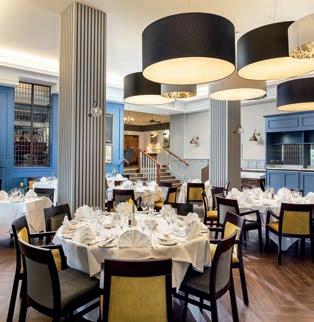

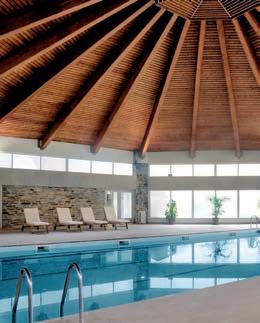

St. Ewe Free Range Eggs’ journey is grounded in deep-rooted family values, where they strive to create a positive impact through a commitment to British farming. Their mission is to be leaders in innovation and champions of welfare, all while staying true to the values that define them: positivity, nurturing, boldness, and transparency.
The welfare of hens is paramount at St. Ewe, which is why the company collaborates with like-minded British family farmers who ensure that hens live in the best conditions possible, with the freedom to roam and forage in the fresh, clean air. This dedication to welfare not only results in happier hens but also in eggs that are richer in taste and have a show-stopping look. St. Ewe are more than just egg producers; they advocate for a better food system.




journey at St. Ewe. This process has sharpened our focus, strengthened our values and culture, and guided us in implementing social and sustainable measures to ensure our business is fit to feed generations to come. We are all about nutrition – providing high-quality food to improve people’s lives – and we believe B Corp certification is a vital part of this journey. It reinforces our message, helps build trust, and confirms our commitment to delivering food in a truly sustainable way.”




As of 2025, St. Ewe Free Range Eggs is a proud B Corp business and the first UK-based egg packing business to achieve this accreditation in Europe. Rebecca Tonks, Farmer, St. Ewe Free Range Eggs’ Founder and CEO, has taken the business from strength to strength, from a small family business to a multi-million-pound operation. She says: Becoming part of the B Corp movement is just the beginning of our




As St. Ewe Free Range Eggs looks to the future, they consider the award to be more than just a badge of achievement, but a framework for measuring and improving how they impact their team, farmers, communities, customers and the environment.
Elle Sambrook, Senior Sustainability Manager at St. Ewe says: B Corp certification is a reflection of who we are as a company: innovative, bold, and honest. It allows us to ensure that our growth is grounded in the principles that matter most to us and our community. By achieving this milestone, we’re not just holding ourselves accountable but setting an example for the industry.”
steweeggs.com
Rebecca Tonks





